We are Music



Insurance products offered through Towne Insurance, a subsidiary of TowneBank, are not a deposit, not FDIC-Insured, are not guaranteed by TowneBank, not insured by any federal government agency, and may go down in value. ©2021 Selective Ins. Group, Inc., Branchville, NJ. Products vary by jurisdiction, terms, and conditions and are provided by Selective Ins. Co. of America and its insurer affiliates. Details at selective.com/who-we-are/selectives-affiliated-insurers. 864-585-2256 | GeorgeJohnsonIns.com IN TUNE WITH OUR CUSTOMERS. Since 1953, George Johnson Insurance has taken pride in listening to and responding to our customers’ needs for home, auto and business insurance solutions. We team with top carriers like Selective that strike the right chord with our customers who want superior products, responsive service and competitive pricing. And, who are as in tune with our customers as we are.
Connect with the Spartanburg Philharmonic!

See photos and video of the symphony on stage, backstage, and behind the scenes. Learn more about music and musical life, and stay up-to-date about our upcoming events. Like, Follow, and Watch

Volume 94, Spring 2023 200 East Saint John Street Spartanburg, SC 29306 864.948.9020 INFORMATION Calendar of Events 4 Ticket Information 5 Your Visit to the Philharmonic 5 Spartanburg Philharmonic Board of Directors 6 Spartanburg Philharmonic Staff 8 Spartanburg Philharmonic Orchestra Committee 9 Corporate Partners & Funders 10 Spartanburg Phiharmonic Annual Fund 12 Legacy Society Funds 15 Instruments of the Orchestra 28 Music Director Search Timeline 32 Spartanburg Philharmonic Musicians 35 We are Music Education 62 Advertiser Index 70 CONCERTS Music Sandwiched In 17 Bluegrass Spartanburg: SteelDrivers 19 Youth Orchestra: Winter Warmer 22 Youth Orchestra: Spring Awakens 23 Zimmerli Series: Heart, Soul, & Cello 37 Espresso Series: Oolong Notes 43 Espresso Series: Fiddle Frappé 45 Zimmerli Series: Tao of Purity & Power 47 Zimmerli Series: American Songscape 53 Bluegrass Spartanburg: Sister Sadie 61 ARTICLES From the Board President & Executive Director 7 Spotlight: Andrew Babb . . . . . . . . . . . . . . . . . . . . . . 20 5 Questions for our Guest Conductors 30 Meet: Joanna Mulfinger, Interim Concertmaster 34 Spotlight: Hannah Simpson 64 Authors Photographers Diana Maley Berti Melanie Coblentz Courtney Oliver Laura-Clare Thevenet Chris Vaneman Anna Bandy Kavin Bradner Jimmy Gibson Kordell Hemphill Peter B. Kay Mark Olencki Brian Smith Design Peter B. Kay Larry Williams
facebook.com/SpartanburgPhil instagram.com/SpartanburgPhilharmonic youtube.com/SpartanburgPhilharmonic 3
CALENDAR OF EVENTS SPRING
Zimmerli Series (page 37)
Espresso Series (page 43)
Bluegrass Spartanburg (page 19)
Youth Orchestra (page 22)
Music Sandwiched In (page 17)
January
Converse Opera Theater
Bluegrass Spartanburg at MSI
February
The SteelDrivers
Winter Warmer
Philharmonic Flutes
Heart, Soul, & Cello
Oolong Notes
Laurel and the Lads
March
District 7 Presents "Frozen"
Fiddle Frappé
Philharmonic Jazz Combo
Tao of Purity & Power
April
May
Windjammers
SpartanburgPhilharmonic.org/ Events
County Library
County Library
County Library
Date
Event
Venue
Wed 1/11 Spartanburg
Wed 1/25 Spartanburg
Sat 2/4 Chapman
Cultural Center
Sun 2/5 Twichell
Auditorium
Wed 2/8 Spartanburg
County Library
Sat 2/11 Twichell
Auditorium
Fri
2/17 Chapman Cultural Center
Wed
2/22 Spartanburg County Library
Spartanburg
Wed 3/8
Fri
3/17 Chapman Cultural Center
Wed 3/22 Spartanburg
County Library
Sat 3/25 Twichell
Auditorium
Wed 4/5 Spartanburg
Wed 4/19 Spartanburg County Library
Sat 4/22 Twichell Auditorium
Tom Fisch, Guitar
County Library The Reel Sisters
American Songscape
Sun 4/23 Twichell Auditorium
Spring Awakens
Sat 4/27 Chapman Cultural Center
Sister Sadie
Wed 5/3 Spartanburg
Classical Healing Keys
County Library
Wed 5/17 Spartanburg
County Library
4
2023
TICKET INFORMATION
SpartanburgPhilharmonic.org/ box-office-venues
Twichell Auditorium
Box Office Hours
10:00 AM - 2:00 PM, M-F
(864) 596-9724
580 East Main Street Spartanburg, SC 29302
Call for: Zimmerli Series & Youth Orchestra
Individual Tickets
YOUR VISIT TO THE PHIL
Chapman Cultural Center Box Office Hours
10:00 AM - 5:00 PM, T-Th
10:00 AM - 2:00 PM, F
(864) 583-2776
200 East Saint John St. Spartanburg, SC 29306
Call for: Espresso & Bluegrass Series
Individual Tickets
Spartanburg Philharmonic Administrative Offices
9:00 AM - 5:00 PM, M-F
(864) 948-9020
200 East Saint John St. Spartanburg, SC 29306
Call for: Season Tickets
Restrooms: Restrooms in Twichell Auditorium are located off of the first floor lobby and next to the handicap accessible entrance in the auditorium. Restrooms at the Chapman Cultural Center are located to the left and right of the main entrance lobby.
Seating: Twichell Auditorium uses a reserved seating system for our Zimmerli Series concerts, so please keep your ticket with you at all times to verify section and seat specifics should there be any confusion. Chapman Cultural Center also uses a reserved ticket system for Bluegrass Spartanburg. For our Espresso Series, Chapman uses a General Admission system and does not reserve seating.
Ticket donation: We are unable to issue refunds for unused tickets. However, if you are unable to attend a concert, we encourage you to donate your tickets back or give them to a friend. When you donate your tickets to the Spartanburg Philharmonic, you not only receive a donation tax receipt, but you also share your seat with another music lover. If you would like to give in this way, please notify our ticket office at least 24 hours prior to the performance.
If a concert is canceled or rescheduled due to inclement weather, a tax letter will be provided for any ticket returned within 24 hours after the original concert date.
Late seating: For the listening pleasure of our audiences, late arriving patrons will not be seated while music is being performed. Latecomers will be seated at the first appropriate pause in the program (typically during applause). Additionally, we ask that patrons who must leave prior to the end of a performance exit only between selections if at all possible.
Food/Beverage: No food or drink, other than bottled water, is allowed in Twichell Auditorium.
Cameras, cell phones, recording devices, watch alarms, and similar devices: To ensure a quality experience for everyone, the use of flash-photography or video/ audio recording equipment is strictly prohibited. Patrons are asked to turn off or mute (not just turn to vibrate) all personal electronic devices prior to the performance.
In
Case of
Emergency: Prior to the performance, we request that you familiarize yourself with the locations of all exits in case of an emergency. If the power to the building should be interrupted for any reason, generators will begin within 10 seconds for lighting.
The Mission of the Spartanburg Philharmonic is to enrich, inspire, and educate through live performances of high-quality music.
5
BOARD OF DIRECTORS









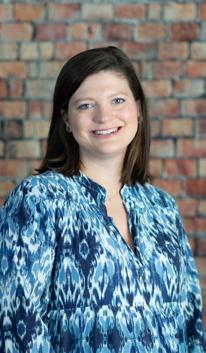



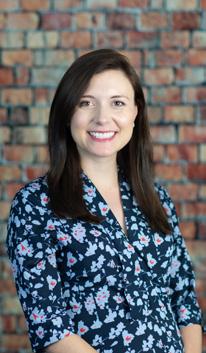




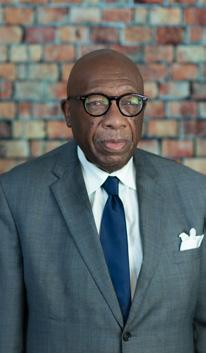




 Karen Parrott President
Dr. Barry Bodie
Dr. Chandra Hopkins
Bert Shuler
James Cheek
Dr. Ohmar Land
Tamela Spann
John Cribb
Samantha Larkins
Helen Tipton
Francie Little
Kate White
Dr. Mark Ferguson
Judy McCravy
Dr. Meisha Whitlock
Peter Grzan
Alex Hunt North Kelsey Wilkes
Laura Henthorn
Dr. Rick Orr
Dr. Cabe Loring President Elect
Karen Bjelland Treasurer
Chris Strickland Secretary Chip McLeod Past President
Karen Parrott President
Dr. Barry Bodie
Dr. Chandra Hopkins
Bert Shuler
James Cheek
Dr. Ohmar Land
Tamela Spann
John Cribb
Samantha Larkins
Helen Tipton
Francie Little
Kate White
Dr. Mark Ferguson
Judy McCravy
Dr. Meisha Whitlock
Peter Grzan
Alex Hunt North Kelsey Wilkes
Laura Henthorn
Dr. Rick Orr
Dr. Cabe Loring President Elect
Karen Bjelland Treasurer
Chris Strickland Secretary Chip McLeod Past President
6 Spartanburg Philharmonic
Dr. Sidney Fulmer Lifetime Board Member
DIRECTOR


Fill a school with music and it becomes better. Fill an education with music and it becomes better. Fill a life with music and it becomes better. Fill a community with music and it becomes better. If you want to make something better, put music right at the heart of it.
- Vaughan Fleschfresser, Music Educator
We are Music Education.
Music Education is the heart of Spartanburg Philharmonic. It is an integral part of our mission statement to engage, educate and inspire. We are committed to exposing the students of Spartanburg County to high quality orchestral educational experiences.
We are Link Up.
We Start Young. Students in the 4th grade throughout Spartanburg County are given the opportunity to join our orchestra in this highly participatory program, in which they learn to sing and play a recorder in the classroom and perform with Spartanburg Philharmonic from their seats at a culminating concert at Twichell Auditorium. For us, it is the best day of the year. Along with staff, a former board member and music educator, Sharon Doyle and many others volunteer to organize and manage this program for Spartanburg Philharmonic. Every spring, the full Spartanburg Philharmonic performs beloved classic orchestral music as the 4th graders and their teachers laugh, sing, play recorders and dance. It is designed to ignite a spark.
We are two Spartanburg Philharmonic Youth Orchestras.
We Keep Challenging. As music students progress through their school orchestras, they may seek more. Prelude Youth Orchestra is designed for 6-9 graders and Symphony Youth Orchestra is a natural progression from 8th grade through 12th grade to expose promising students to advanced repertoire and to meet likeminded students from across the Upstate. The Youth Orchestra students meet every Sunday afternoon, to the dedication of their families and to our employees along with volunteer music educators. Three Sunday afternoon SPYO Concerts showcase the best of our young people. During Covid, it was the one educational
program that we were able to keep moving forward. The impact on our students is tangible.
The music department is an alternative universe where pupils are often unrecognizable from who they are outside of it. The shy become confident. The agitated become calm. The lonely become included. The quiet become heard. And the lost become found. Music reveals the real child.
- Vaughn Fleschfresser
We are a Music Team.
It Takes a Village. With our mighty staff of 3 full-time and 5 part-time employees, it is all hands-on deck. Our dedicated Youth Orchestra co-managers, Helen Tipton, board member/music educator/professional musician who is the “secret sauce” of the entire enterprise and Bob Borden, our Music Librarian, dedicate their time to the behind-the-scenes work. Two part-time conductors, Dr. Susie Lalama and Johanna Wilson, have dedicated their life’s work to music education and they organize, rehearse and conduct these orchestras. At least a dozen local music educators volunteer their time, mentoring students with advanced repertoire. Our part-time community engagement coordinator, Kordell Hemphill, brings organization and energy. And through two generous grants, SPYO has employed our first part-time Education Manager, Hannah Simpson, who will engage with schools, teachers, mentors and students to expand the impact of music education on our students and open new opportunities.
We could not do this without the support of our board and the foundations, donors and scholarships including the Johnson Family and JM Smith for Link Up and The Balmer Foundation and The Spartanburg County Foundation for the Youth Orchestras.
Your generosity enables us to continue the legacy of offering high-quality orchestral educational experiences to our next generation. We are so very grateful.
We are Music Education.
Karen Parrott President of the Board of Directors
Kathryn H. Boucher Executive Director
FROM THE BOARD PRESIDENT & EXECUTIVE
7 HearHere: Spring 2023
YOUTH ORCHESTRA
SpartanburgPhilharmonic.org/staff



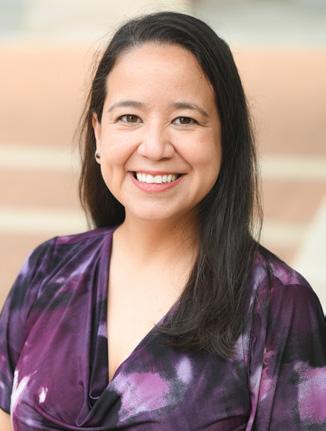

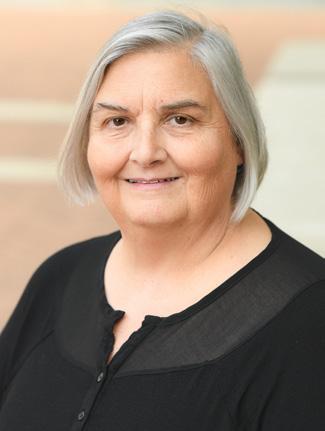


PHILHARMONIC STAFF
Hannah Simpson Education Manager
Kordell Hemphill Community Engagement Coordinator
Robert G. Borden Orchestra Librarian
Susana M. Lalama Symphony Conductor
Johanna Wilson Prelude Conductor
Kathryn H. Boucher Executive Director
Peter B. Kay General Manager & Composer in Residence
8 Spartanburg Philharmonic
Courtney Oliver Marketing & Special Events Manager
ORCHESTRA COMMITTEE
The goal of the Spartanburg Philharmonic’s Orchestra Committee is to amplify our musicians’ voices throughout the organization and ensure that communication runs smoothly among musicians, staff, and board. Committee members provide a musician’s insights on operational issues like COVID-19 policies as well as artistic policies like outlining a new process for how to select the next concertmaster. We also mediate complaints and conflicts among musicians and staff. Some members serve on multiple committees – we have two members serving on the Music Director search committee – to facilitate communication among groups. At least one member of the orchestra committee attends each board meeting to convey the considerations and concerns that are unique to the world of working musicians. This participation ensures that musicians are a part of the decision making at the highest level of the organization.



Orchestra Committee members are elected from among the core musicians of the orchestra, those members who


have won their spot in the orchestra through audition. We represent most of the instrument families – strings, brass, and woodwinds with current members – and have experience playing in more than a dozen orchestras across the region which helps us stay current with best practices from the field. Our day jobs range from college professor to middle school orchestra director to financial advisor to work-from-home mom, and these varied experiences bring diverse perspectives to our decision making. We are proud to represent the musicians of the Spartanburg Philharmonic and are deeply grateful for the tremendous support from the community, the board of directors, and the staff who have kept the organization financially and operationally sound during such a difficult period. We look forward to continuing to support our fellow musicians as we make fantastic music this season and for many, many seasons to come.
 Ian Bracchitta Principal Bass
Alvoy Bryan Jr. Principal Viola
Andrew Merideth Associate Principal Horn
Theresa Jenkins Russ Violin Section
Kelly Vaneman Associate Principal Oboe
Diana Maley Berti Orchestra Committee Chair, Viola Section
Ian Bracchitta Principal Bass
Alvoy Bryan Jr. Principal Viola
Andrew Merideth Associate Principal Horn
Theresa Jenkins Russ Violin Section
Kelly Vaneman Associate Principal Oboe
Diana Maley Berti Orchestra Committee Chair, Viola Section
9 HearHere: Spring 2023
Diana Maley Berti Committee Chair
CORPORATE PARTNERS


When arts and businesses partner, everyone profits. With corporate partnerships, our concerts and events provide invaluable exposure to prospective and current clients, educate the public about your business initiatives, offer networking opportunities with clients, and provide benefits for employees.


For full details regarding our Corporate Partnership packages, please contact:
 Kathryn Boucher, Executive Director
Kathryn Boucher, Executive Director

kathryn@spartanburgphilharmonic.org
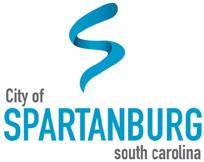
FUNDERS
FOUNDATION

10 Spartanburg Philharmonic
Balmer FOUNDATION
Donations given to Chapman Cultural Center’s Annual United Arts Fund supports Spartanburg Philharmonic through a General Operating Support Grant.
Chapman Cultural Center is a proud supporter of Spartanburg Philharmonic and their mission.

SPARTANBURG PHILHARMONIC ANNUAL FUND
We gratefully acknowledge the following donors who made generous commitments to the Spartanburg Philharmonic. This list reflects gifts received July 2021 through June 2022.
Benefactor ($15,000+)
Mr. and Mrs. William Barnet III
An Evening of Divertimentos & Dressage
Mr. and Mrs. George Dean Johnson, Jr.
Alfred Moore Foundation
Carlos Moseley Trust
Mrs. Nelly Zimmerli
Virtuoso & Podium ($5,000-$9,999)
Mr. and Mrs. Andrew Babb
Dr. Barry Bodie and Ms. Laurel D. Johnson
Mr. and Mrs. John S. McBride, Jr.
Baton ($2,500-$4,999)
The Arkwright Foundation
Mr. and Mrs. Roger Habisreutinger
Ms. Laura Henthorn
Mrs. Michael Kohler, Jr.
Mr. and Mrs. Paul Lehner
Principal ($1,000-$2,499)
Laura Allen and Roger Sullivan
Mr. and Mrs. Stanley Baker
Mrs. Susan H. Baker
Ms. Karen E. Bjelland
Ms. Kathryn H. Boucher
Ms. JoAnn Bristow
Mr. James Cheek
Mr. and Mrs. Jerry Cogan
Mr. and Mrs. Halsey Cook
Mr. and Mrs. Ken Deems
Mr. and Mrs. Ray Dunleavy
Mr. and Mrs. David Ellis
Mr. and Mrs. V. C. McLeod, III
Mr. and Mrs. Thomas P. Nederostek
Mr. and Mrs. Wiley North
Dr. and Mrs. Rick Orr
Mr. and Mrs. Stephen P. Parrott
Mr. and Mrs. Geoffrey Wilson
Ms. Wallace Eppes Johnson
Mrs. Angelina Eschauzier
Mr. and Mrs. Kenneth R. Frick
Mr. Peter Grzan
Dr. Leslie W. Howard, Jr.
Dr. and Mrs. Louis Knoepp, Jr.
Dr. Ohmar Land
Mr. and Mrs. Lindsay Little
Dr. and Mrs. Caleb Loring, IV
Col. and Mrs. Robert N. Maddox
Ms. Judy McCravy
Mr. E.T. McLean
Mr. and Mrs. Don Miles
Bob and Karen Mitchell
Dr. Melinda Moretz
Mr. John R. Murphy
MG(R) Edwin E. Spain, III & Mary B. Spain
Mrs. Jack Steinberg
Mr. and Mrs. Walter Sunderlin
Mr. and Mrs. H. Peter Theiler
Mr. and Mrs. Marshall T. Walsh
Dr. Meisha Whitlock
Mr. and Mrs. Donald Wildman
SpartanburgPhilharmonic.org/ GiveNow 12 Spartanburg Philharmonic
Fellow Musician ($500-$999)
Mr. and Mrs. Tom Barnet
Mr. Robert Borden
Dr. and Mrs. James Bradof
Mr. Mark Carlson
Mrs. Jerome R. Cogdell
Mr. and Mrs. Paul Cote
Allen and Sharon Doyle
Ms. Alice M. Eberhardt
Mr. and Mrs. Lawrence Flynn, Jr.
Ms. Elizabeth Glenn
Patron ($150-$499)
Dr. and Mrs. Mitchell Hurst Allen
C. Mack and Patty Amick
Mr. Walker Barnes
Mr. and Mrs. Charles Baxter
Martha and Clarke Blackman
Mr. and Mrs. Thomas Blexrud
Mr. and Mrs. Tim Brannon
Dr. John Burchfield
Dr. Andrew Taber and Ms. Alyson Campbell
Mr. Bill and Mr. Martin Cooper-Meek
Mr. James C. Curry
Ms. Lynda Davis
Mr. and Mrs. Frederick B. Dent, Jr.
Isaac and Darlene Dickson
Dr. Jean Dunbar
Ms. Elaine T. Freeman
Mr. Heiner Gallmann
Gerald and Hanh-Trang Ginocchio
Mr. and Mrs. James Glenn
Members ( $50-$149)
Ms. Kathy J. Allen
Mr. David Anderson
Ms. Patricia Battle
Mrs. Margaret Baughman
Diana and Alden Berti
Christopher and Rachel Brough
Mr. and Mrs. Robert W. Burnette
Dr. and Mrs. William W. Burns
Mr. and Mrs. W. Waller Caldwell, Jr.
Mr. and Mrs. David Cecil
Mr. and Mrs. John Thomas Claggett
Ms. Barbara Colvin
Ms. Patricia Cook
Ms. April Preston and Mr. Kyran Dowling
Mr. and Mrs. Brandt Goodwin
Mr. and Mrs. Gaston C Harris Jr
Dr. and Mrs. David A. Holt
Mrs. Patricia Hudgens
Cathryn and Michael Judice
Dr. Peter B. Kay & Ms. Jennifer Bonner
Clint and Samantha Larkins
Mr. and Mrs. William C. Mayrose
Mrs. PJ Morrow
Mr. and Mrs. Walter Oliver, IV
David and Jennifer Smart
Mr. and Mrs. Garrett Snipes
Ms. Johanna Lewis and Mr. Richard Spiers
Mr. and Mrs. Eliot Stone
Mr. and Mrs. Robert Troup
Mr. and Mrs. John F. Verreault, III
Mr. and Mrs. Glen Warner
Mr. and Mrs. Taylor White
Mr. J. Mark Hayes, II
Mr. and Mrs. Robert Houston
Mrs. Lucy Hummers
Mr. and Mrs. Robert E. Hyatt
Dr. and Mrs. William A. James
Mr. and Mrs. Chip Johnson
Rear Admiral and Mrs. Stephen Johnson
Mr. Stephen Josefski
Mrs. Nancy Zoole Kenney
Mr. and Mrs. Thomas N. King
Mr. Vincent J. Krydynski, Jr.
Mr. and Mrs. George Loudon, Jr
Mr. Harold Luhrsen
Mr. and Mrs. Kingsley Martin
Mr. Boyce Miller
Ms. Cabell Mitchell
Mr. Jeffrey Nye
Mr. and Mrs. Daniel O’Connell
Mr. Dwight F. Patterson, Jr.
Dr. and Mrs. Jan Postma
Dr. and Mrs. Nayef H. Samhat
Ms. Joy Shackelford
Mr. and Mrs. Hubert Shuler
Mr. and Mrs. Richard Strasburger
Mr. and Mrs. Chris Strickland
Mr. and Mrs. John Tipton
Mr. and Mrs. Gregory Wade
Mrs. Margit Wagner
Drs. Edward and Petra Warren
Mr. and Mrs. Paul D. Weaver
Douglas and Rita Weeks
Maryela and Frank Weihrauch
Ms. Linda Sangster West
Ms. Johanna Wilson
Ms. Libbo Wise
Dr. and Mrs. Auburn Woods
Mrs. Sharon Free
Dr. and Mrs. Stephen L. Garrell
Col. (Ret.) and Mrs. James D. George, Sr
Todd and Ginger Greer
Mr. and Mrs. Richard Hamrick
Mr. and Mrs. Peyton Harvey
Mrs. Ava Hughes
Ms. Nancy Hughes
Harriet and David Ike
Ms. Mary Jenkins
Mrs. Julian C. Josey, Jr.
Ms. Robin Krajnik
Dr. Susana Lalama
Ms. Cornelia Linder
Thorne and Harrison Martin
Mr. Daniel Mayer
Ms. Carol B McCulloch
Mr. and Mrs. John P. Moore
Dr. Terry O. Pruitt
Ms. Elizabeth Refshauge
Ms. Naomi Richardson
Mr. and Mrs. Marshall Rogers, Jr
Dr. and Mrs. Bertram C. Sippola
Mr. and Mrs. Nalin Srivastava
Mr. and Mrs. Frederick Stoll
Mrs. Martha I. Tiller
Roger and Kathleen Wildfeuer
Mr. and Mrs. Bob Wynn
SpartanburgPhilharmonic.org/ GiveNow 13 HearHere: Spring 2023


14 TheJohnsonGroup.com Proud to support the arts in our community with a standing ovation. At The Johnson Group, we believe in the power of partnership and the transformative energy of the arts. That’s why we’re proud to support the Spartanburg Philharmonic.
LEGACY SOCIETY FUNDS
Many donors feel strongly about preserving the legacy of classical music in the community. They are able to do so by remembering the Spartanburg Philharmonic in their wills, or by creating a planned gift to benefit the Philharmonic. These gifts can be un-restricted, or designated for a special purpose such as the endowment of the Philharmonic.
The array of giving options and the ways you can incorporate them into your planning are as varied as the circumstances they serve. We are always available to provide you with further information and suggestions on gifts that fit your lifestyle and philanthropic goals.
THE UTLEY LEGACY SOCIETY
We have created the Utley Legacy Society to provide a fund through which friends can make bequests in a number of different ways. The easiest method is an instruction in a Will to leave a specific dollar amount to Spartanburg Philharmonic. It is a simple matter to add a codicil to an existing Will, giving the direction to make a gift from your estate to the Society. Gifts may also be made by giving appreciated securities or other assets, by way of charitable trust, through gift of life insurance, or by gifts of retirement account assets.
If you have chosen to remember the Philharmonic in this manner, we would like to hear from you and to include you either by name or anonymously (your choice) as a member of the Legacy Society. Members will enjoy a variety of Spartanburg Philharmonic activities as major donors.
THE JERRIE LUCKTENBERG CONCERTMASTER CHAIR ENDOWMENT

Dr. Jerrie Lucktenberg - former Concertmaster of the Greater Spartanburg Philharmonic (now the Spartanburg Philharmonic), artist, pedagogue, and author - retired from her position during the Philharmonic’s 2002-2003 season. To help ensure the presentation of Spartanburg’s professional orchestra in our community, Dr. Lucktenberg made a generous gift of $50,000 towards the endowment of the Concertmaster Chair. With your help, the Philharmonic has matched this gift, fully endowing the chair as the Jerrie Lucktenberg Concertmaster Chair. We hope you will be inspired to follow Dr. Lucktenberg’s generous lead.

For information about supporting a Legacy Society Fund, contact Kathryn Boucher, Executive Director: kathryn@spartanburgphilharmonic.org | 864.948.9020
 Dr. Joe Roy Utley & Dr. Joella Utley
Dr. Joe Roy Utley & Dr. Joella Utley
15
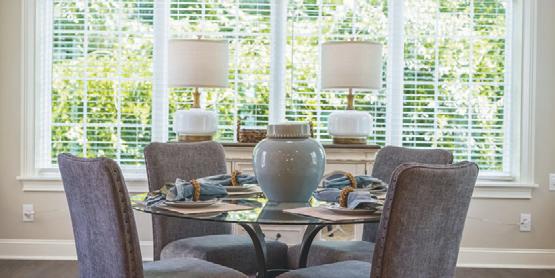











Spartanburg’s Premier Retirement Community 110 Summit Hills Drive I Spartanburg, SC 29307 (864) 408-8850 I Summit-Hills.com Independent Living • Assisted Living Memory Care • Skilled Nursing • Rehab
Spartanburg County Public Library, Headquarters


151 South Church Street

WEDNESDAYS
12:15 - 1:00 PM Read


Music Sandwiched In
Celebrating over 25 years of Music Sandwiched In, Spartanburg Philharmonic is proud to present an exciting line up of performers for its popular series at the Spartanburg County Public Library Headquarters! MSI is on-going, throughout our season, and all concerts are free and open to the public. All are welcome!
Spring
Jan. 11 Converse Opera Theatre
Jan. 25 Bluegrass Spartanburg
Feb. 8 Philharmonic Flutes
Feb. 22
Laurel and the Lads
Mar. 8 District 7 Presents
Mar. 22
Apr. 5
Philharmonic Jazz Combo
Tom Fisch, Guitar
Apr. 19 Reel Sisters
May 3 Classical Healing Keys
May 17 Windjammers
BEYOND THE SYMPHONY
BARRET ROOM
more online:
Partnership
SpartanburgPhilharmonic.org/ MSI
to
Presented by Spartanburg Philharmonic
In
with:
Programs subject
change. All timings are approximate. 17
HearHere: Spring 2023

T S. REEL ROBERTSON 721 E. Main Street Spartanburg, SC 29302 reel@sreelrobertsoncpa.com Certified Public Accountant (864) 583-2450 Fax: (864) 582-7332
SteelDrivers
SATURDAY
Feb 4, 2023
8:00 PM
@ Chapman Cultural Center

Bringing That Bluegrass Swagger
What began as a casual jam session over a decade ago has become one of today’s leaders in the Americana/Bluegrass music world. The venerable Rounder Records immediately signed the band and released their eponyemous debut in 2008 that scored their first GRAMMY nomination for Best Country Performance by a Duo or Group w/ Vocal for the song “Blue Side Of The Mountain.” Again in 2010, the group’s sophomore effort Reckless, received two more nods for Best Bluegrass Album and Best Country Performance by a Duo of Group with Vocal, courtesy of the universally popular hit “Where Rainbows Never Die.”
The group’s star continued to rise with the release Hammer Down that debuted at #1 on the Billboard Bluegrass Charts. Their accomplishments continued with the highly anticipated 2015 The Muscle Shoals Recordings that also won a GRAMMY Award for
Best Bluegrass Album The Muscle Shoals Recordings, as well as three IBMA nominations for Album, Song, Songwriter (Tammy Rogers) and Liner Notes (Peter Cooper) of the Year honors.
In 2018 the group made Grand Ole Opry history as the quintet was joined by superstars John Prine and Bill Murray on the revered stage to perform. Other accolades include a cameo in the Murray flick “Get Low,” music placement in various TV and movies including the popular drama “Yellowstone,” and specially recordings with the military group Six String Soldiers.
In 2020, Tammy Rogers, Michael Fleming, Richard Bailey, Brent Truitt and Kelvin Damrell (his first project as lead vocals) released the chart-topping Bad For You to both industry and media aplomb. The quintet tours an average of 75 dates annually while continuing to bring world-class music to people.

BLUEGRASS SPARTANBURG CHAPMAN CULTURAL CENTER
Info & Tickets:
19 HearHere: Spring 2023
Spotlight: Andrew Babb

Godfather of Bluegrass Spartanburg
We interviewed loyal donor, patron, and “Godfather of Bluegrass Spartanburg,” Andrew Babb to get his take on all things bluegrass in Spartanburg right now. In 2015, along with a few other donors and bluegrass fans, Andrew started the initiative to create Bluegrass Spartanburg, which was then known as the Chapman Cultural Center Bluegrass Series. Since its founding, Bluegrass Spartanburg’s goal has been to bring world-class and award-winning acts to the stage, and they have achieved just that with past performances from Béla Fleck & Abigail Washburn, Flatt Lonesome, Sam Bush, Rhonda Vincent, and next with future performances from The SteelDrivers and Sister Sadie.
Q. What inspired you to dedicate a space for bluegrass music at the Spartanburg Philharmonic?
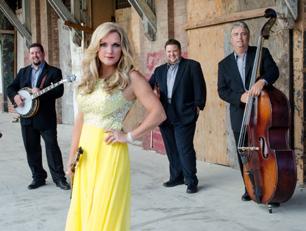
A. I realized that Chapman Cultural Center was not a presenter, so Jennifer Evins and I collaborated to see if it could work! Twenty-one patrons all gave $1,000 to have the first two concerts. The proceeds from ticket sales created the funding for the entire Bluegrass Spartanburg series.
Q. How did you become a fan of bluegrass music?
A. I have always loved the banjo. I also worked in West Virginia one summer and got to see The Coal Miners come play at the Red Robin Inn near Williamson, West Virginia.

Q. What are you looking forward to the most this year with Bluegrass Spartanburg?
A. The SteelDrivers show on February 4 will be incredible. Only a handful tickets are left, and you don’t want to miss out!

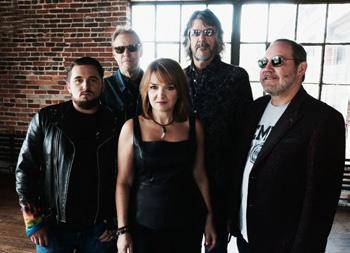
Q. Who are your biggest influences in bluegrass?
A. Del McCoury Band and Béla Fleck! We were fortunate enough to have both of these legends grace the Bluegrass Spartanburg stage, so it’s been really cool to see everything come full circle.
Q. In your opinion, who is the best new artist in bluegrass right now to keep an eye on?
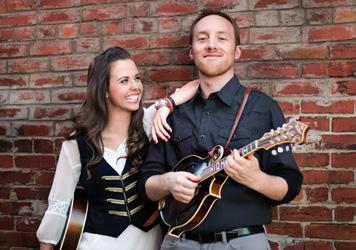
A. Definitely Billy Strings! We had him at RJ Rockers twice before he was discovered.
Q. What has the community response been to Bluegrass Spartanburg since it started?
A. It has been great! When you go to the shows you can see people who have come from neighboring communities to visit our great city.
SPOTLIGHT
Left: Andrew Babb; Past bands: Rhonda Vincent & the Rage; Sam Bush; SteelDrivers; Bela Fleck & Abigail Washburn (with Andrew); Sierra Hull & Justin Moses
20 Spartanburg Philharmonic
Laura-Clare Thevenet Contributing Author
Q. What has the musician’s response been?


A. I think they love playing at both Chapman and Twichell. Both venues are so special to listen to bluegrass music.
Q. How has Bluegrass Spartanburg evolved since its inception?
A. At first it was a bunch of patrons who may or may not have loved bluegrass, but donated and came to support something new in our community. I believe the guests now are all bluegrass enthusiasts.
Q. Do you have a musical background yourself?
A. I cannot play a lick, but I love to listen!
Q. Why do you think the arts are so important to the Spartanburg community?



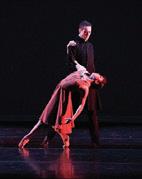

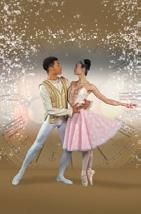
A. Art brings people from all walks of life together and is important in helping recruit new businesses to our community. Also, Spartanburg is a music city with a long-standing history. The Marshall Tucker Band started here, as well as a few other icons like Marshall Chapman, Don Reno, David Ball, and Buck Trent just to name a few. As a community, we’ve always been very proud to support the arts and share that passion with others.
The next act to take on the Bluegrass Spartanburg stage is Grammy award-winning group The SteelDrivers on February 4, 2023 at Chapman Cultural Center. Single tickets and season subscriptions are available for purchase now. Subscribe to the full season and save 10% off single ticket prices and service fees. Don’t miss out on this world-class bluegrass performance!
SPOTLIGHT
Making the Ordinary, Extraordinary. Member FDIC. © 2022 United Community Bank | ucbi.com OCTOBER 21, 2022 OCTOBER 22, 2022 3PM, 7PM OCTOBER 23, 2022 3PM ADULT $25 SENIOR $23 STUDENT $20 BALLETSPARTANBURG.ORG OR 864-542-2787 The Studio Series THE COMPANY FEBRUARY 10, 2023 PM, 8 PM FEBRUARY 11, 2023 PM, 8 PM ADULT $30 SENIOR $20 BALLETSPARTANBURG.ORG 864-583-0339 MARCH 24, 2023 ADULT $25 SENIOR $23 STUDENT $20 BALLETSPARTANBURG.ORG 864-542-2787 Johnson APRIL 21, 2023 APRIL 22, 2023 7:30PM BALLETSPARTANBURG.ORG 864-542-2787 TheNutcracker DECEMBER 9, 2022 7PM DECEMBER 10, 2022 3PM, 7PM DECEMBER 11, 2022 3PM ADULT $45 SENIOR $35 STUDENT $25 BALLETSPARTANBURG.ORG OR 864-596-9724 Tickets: BalletSpartanburg.org
Winter Warmer
Conductors
Susana Lalama & Johanna Wilson
ABOUT THE MUSIC
February 5, 2023 3:00 PM
Online: Jean Joseph Mouret, arr. Leidig Rondeau from Masterpiece Theater 3 min George Frederich Handel, arr. Isaac Celebration from Music for the Royal Fireworks 2 min Brian Balmages Forever Joyful! 3 min Jerry Bock, arr. Baumel Selections from Fiddler on the Roof 5 min I. Tradition II. If I Were a Rich Man O'Neill & Kinkel, arr. Phillips Wizards in Winter 4 min Programs subject to change. All timings are approximate. SPARTANBURG PHILHARMONIC YOUTH ORCHESTRA TWICHELL AUDITORIUM T.V. Short Maud "Valse Brilliante" 6 min featuring Connor Bruce, trumpet Franz Schubert Symphony no. 8, "Unfinished", I. Allegro Moderato 12 min Harold Arlen Over the Rainbow 3 min Johannes Brahms Hungarian Dance no. 5 3 min 22 Spartanburg Philharmonic
Program
ABOUT THE MUSIC Program Online: Programs subject to change. All timings are approximate. SPARTANBURG PHILHARMONIC YOUTH ORCHESTRA TWICHELL AUDITORIUM April 23, 2023 3:00 PM Conductors Susana Lalama & Johanna Wilson Spring Awakens Kathryn Griesinger Epic Adventure 3 min Gary Gackstatter Blackberry Blossom 3 min Soon Hee Newbold A Soldier's Hymn 4 min Traditional, arr. Stephan When Johnny Comes Marching Home 3 min Edvard Grieg Piano Concerto in A minor, op. 16, I. Allegro moderato 13 min featuring Caroline Dillard, piano Aaron Copland Simple Gifts from Appalachian Spring 3 min Andrew Lloyd Webber Selections from Phantom of the Opera 12 min 23 HearHere: Spring 2023
CONCERTO WINNERS
Connor Bruce
FEATURED SOLOIST, TRUMPET
Connor Bruce is a senior trumpeter at Dorman High School. He is extremely dedicated not only to his school music program but also to improving his musical abilities. Connor plans to study music education after high school and become a band director.
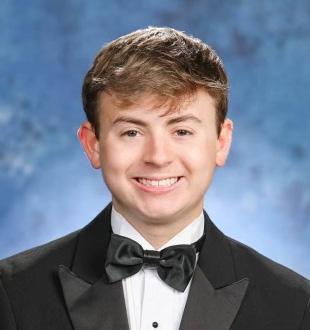
Caroline Dillard
FEATURED SOLOIST, PIANO

Caroline Dillard is a junior at Boiling Springs High School, and has studied piano since she was 5. She currently studies with Susan McCraw, and also studies violin with Ann Buttimer. After high school, Caroline plans to pursue a double major in business and piano, as well as continuing to play the violin in an orchestra.
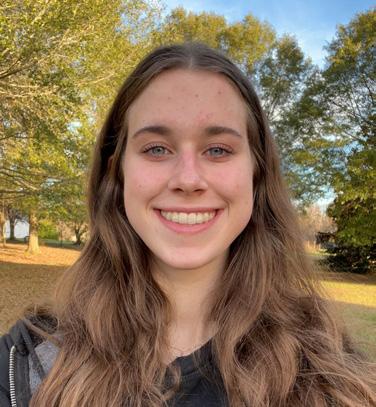
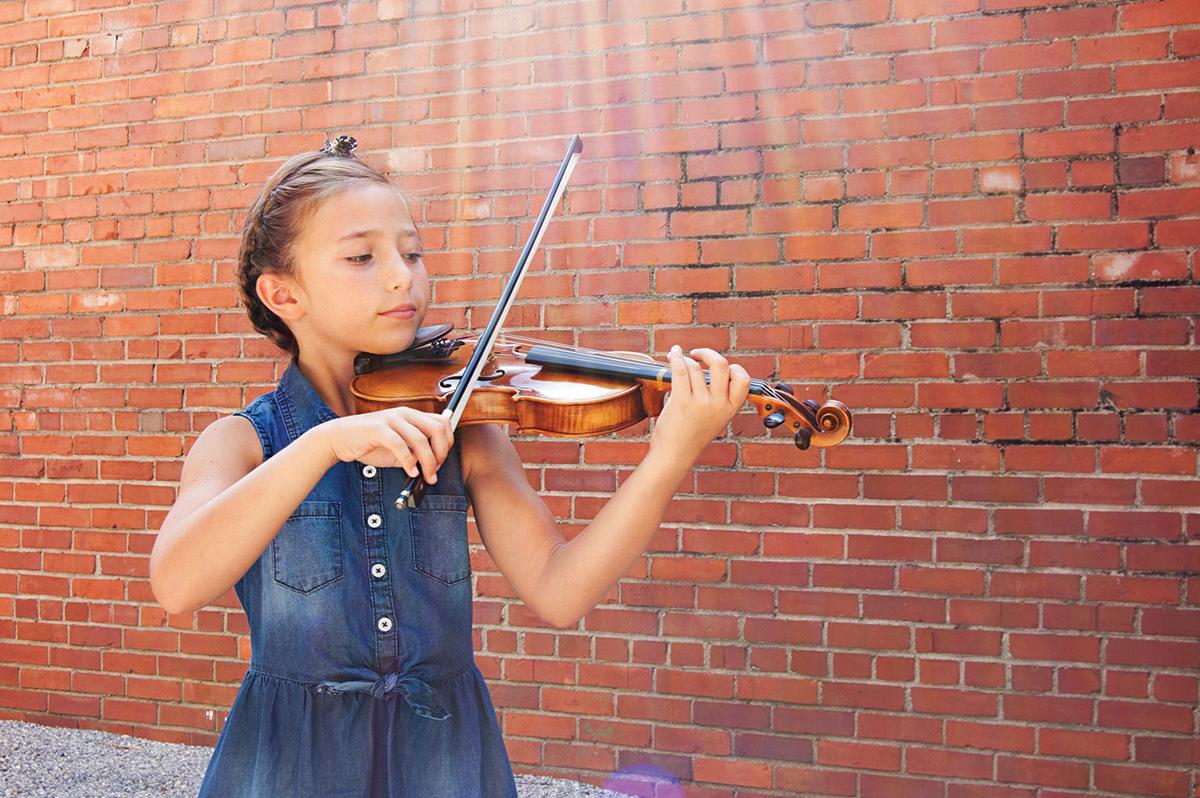
SPARTANBURG PHILHARMONIC YOUTH ORCHESTRA
2022-2023
Susana Lalama
SYMPHONY CONDUCTOR
Susana M. Lalama, Ph.D., is Associate Professor of Music Education and Director of the Petrie School of Music at Converse University. Dr. Lalama teaches undergraduate and graduate courses in instrumental music education and conducting, and supervises student teachers in instrumental music. She also advises graduate music education master’s theses and projects. Prior to her appointment as Director of the Petrie School of Music, she served as the Conductor of the Converse Wind Ensemble.
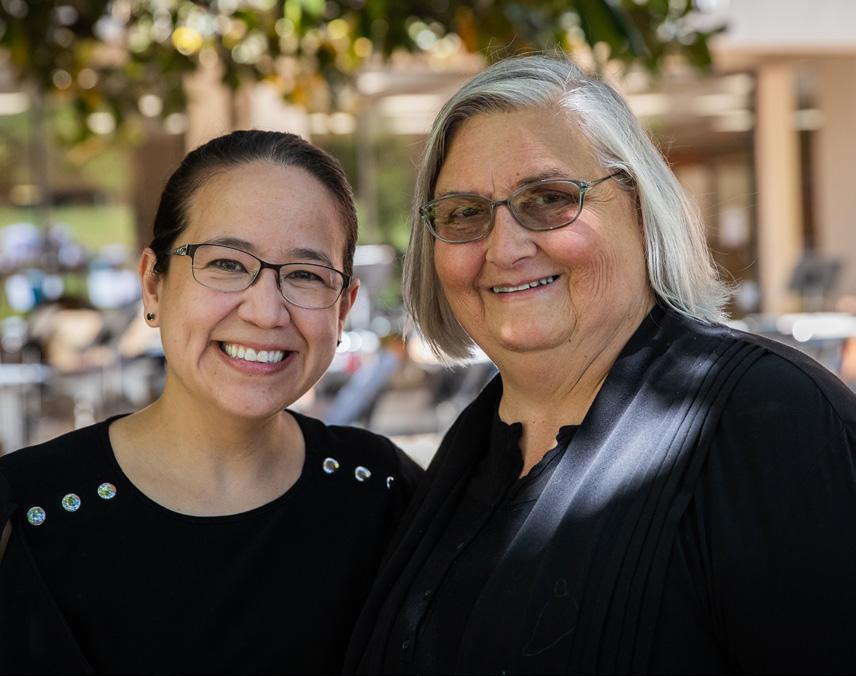
Dr. Lalama grew up in Miami, Florida, and went on to pursue her music education degrees from the University of Miami. Prior to her graduate degrees, she served as Director of Bands at Barbara Goleman High School in Miami Lakes, where under her direction, the wind ensemble, jazz band, and marching band consistently received superior ratings at district and state music performance assessments.
When not teaching in the classroom, Dr. Lalama serves as the adviser of the Collegiate NAfME Converse Chapter. She also serves on the South Carolina Music Educators Association executive board as Past-President of the Higher Education Division and is the Editor of the South Carolina Musician, the official publication of SCMEA.
Dr. Lalama is an active scholar, presenter, and researcher in music education. She has presented music education workshops on topics such as strategies for teaching intonation, classroom management for large ensembles, the student teaching experience, and artistry in conducting. Her research interests are centered on caring climates, student social behaviors, and music teacher education.
Johanna Wilson
PRELUDE CONDUCTOR
A native of Spartanburg, South Carolina, Johanna Wilson has taught strings in elementary, intermediate, middle and high school programs for the past 42 years in Richland School District One and Lexington School District One. Before retiring in the spring of 2020, she was the Director of Orchestras at Lexington High School and as well as teaching beginning string classes at Pleasant Hill Elementary School.

Active in local, state, and national teaching and string organizations, she is Past-President of the South Carolina Music Educators Association Orchestra Division and the South Carolina String Teachers Association with NSOA. Her professional affiliations include ASTA, SCASTA, NAfME, SCMEA and Phil Kappa Lambda. Ms. Wilson was a conductor with the South Carolina Youth Orchestra Program from 1983-1990. For twelve years she was the Master Teacher with Robert Jesselson at the USC String Project. She has served as a judge, adjudicator, or guest conductor for contests, SCMEA Region Orchestras, The Southeastern Honors Orchestras at The University of Tennessee, and other festivals throughout the southeast.
Her experience, as a performer, includes twelve years with the South Carolina Philharmonic Orchestra and three years with the Lake Murray Symphony Orchestra. Ms. Wilson received her BA and Masters of Music Education degrees from the University of South Carolina in Columbia. In 2005, she was named the SCASTA Conductor of the Year. She has a daughter, Katherine, who is the orchestra director at Crayton Middle School in Columbia, South Carolina.
ABOUT THE SPYO CONDUCTORS
25 HearHere: Spring 2023
Susana Lalama and Johanna Wilson at an SPYO concert in April 2021
Spotlight: SPYO Alumni
In 2019, the Youth Orchestra branch of the Spartanburg Philharmonic was created as a way to bring the most musically talented youth together from the Spartanburg school districts. The Philharmonic works with music teachers from the seven different districts to supply diverse talent to the Spartanburg Philharmonic Youth Orchestra (SPYO).

Now that the SPYO has celebrated several successful years of existence, it allows us to see the impact participation has on a student after graduation.
As a supporter of the arts, a Spartanburg county parent, and a freelance journalist; I was invited to get to know the Youth Orchestra a little bit better. I love that our community has a resource like the Philharmonic for both musicians and music lovers alike.
I recently caught up with two of the gifted students who participated in the SPYO to find out what they are doing with the experience they obtained.
The first alumni I had the pleasure of speaking with was, Marqual Littlejohn. Marqual joined the SPYO as a talented trumpet player, and has chosen to make music a career path. Not only has he chosen to make music his focus, he’s chosen to focus partially on music education while pursuing a degree at North Greenville University. His other collegiate focus is obtaining a degree in musical performance. This talented young man hopes to focus his attention on both classical and jazz fields; and would also like to have an ensemble of his own, finding success like musical talents John Williams, and Grainger.
Marqual feels his time with SPYO better equipped him to handle a principal part in ensembles like the Concert Band, Symphony Orchestra, Jazz and Chamber groups. It also exposed him to more difficult literature than he was given
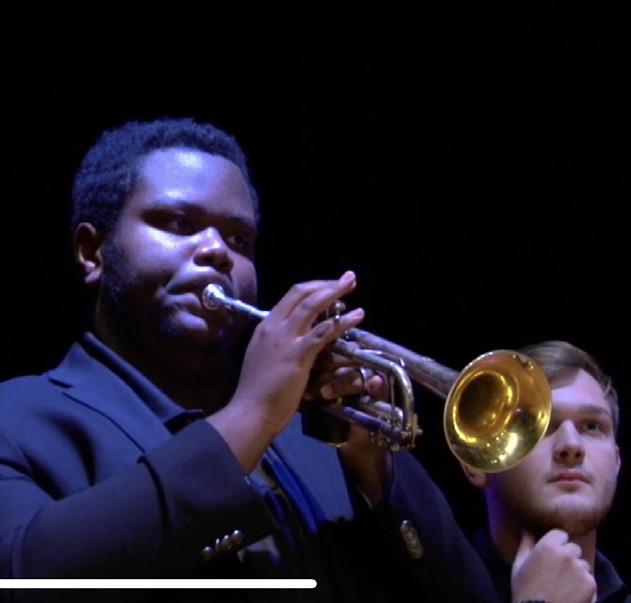
SPARTANBURG PHILHARMONIC YOUTH ORCHESTRA
Melanie Coblentz Contributing Author
Above: Marqual Littlejohn
26
Below: Katie Whitehouse
Spartanburg Philharmonic
as a part of the high school curriculum, which pushed him to practice properly and strengthened his ability as a player.
Another graduate I spoke to was Katie Whitehouse, currently a sophomore at Western Carolina University.

Katie held the honor of principal flute for two years with SPYO. She shared that having that role meant she was expected to set the standard for fellow musicians and the Principals that came after her. Being a role model amongst her fellow musicians prepared her for a collegiate music career. It gave her confidence in her musical abilities, especially in a new environment. This leadership position within the symphony helped her choose a career path in musical education.
“I chose Music Ed because I have always had a passion for music, it always felt natural.” Katie explained, “Throughout high school, I learned that I loved teaching and sharing my passion for music with others. Seeing others succeed is so rewarding to me and I knew that I wanted to make that my livelihood.”
In the time that has passed since leaving the SPYO, she was named Principal Flute in the WCU Wind Ensemble last year and successfully made the Wind Ensemble again this semester to play under the direction of Margaret Underwood. This semester she also had the opportunity to teach and work with the Iconic “Pride of the Mountains” Marching Band as a Woodwind Caption Coordinator.
This season the band had the privilege of performing at the BOA Grand Nationals Competition.
Looking towards the future, Katie plans to continue tutoring students at the high school level, and pursue a job as a teacher in a college or university setting. She also hopes to one day play with a local symphony, and surround her life with music.
Musical expression helps students in so many ways. These students are just two of the many students that have decided to continue their focus on music after their experience with the SPYO. I’d like to thank Marqual and Katie for sharing their experiences with me, and the patrons of the Spartanburg Philharmonic.
Auditions for the Youth Orchestra are only held in May, but if your child or grandchild has shown an interest in music, bringing them to experience the Spartanburg Philharmonic’s Youth Orchestra and other performances from the audience is a great way to prepare them for what will be expected as a member.
A complete list of the 2022-23 season performances can be found on the Spartanburg Philharmonic Youth Orchestra or Spartanburg Philharmonic website.
www.SpartanburgYouthOrchestra.org
SPARTANBURG PHILHARMONIC YOUTH ORCHESTRA 27 HearHere: Spring 2023
INSTRUMENT ROADMAP
FLUTES & PICCOLOS
The highest, clearest sounding instruments in the woodwind family, the flutes and piccolos are seated in the middle of the stage, directly in front of the conductor.
OBOES & ENGLISH HORNS
The oboe and its larger sibling the english horn are seated next to the flutes. The oboe is the first thing you hear when the full symphony tunes at the beginning of a concert.
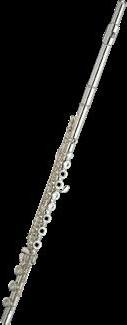
CLARINETS
Clarinets come in a variety of sizes, from the small and highpitched E-flat, to the middle range B-flat, all the way down to the Bass Clarinet. They sit behind the flutes in the middle of the stage.


BASSOONS
The bass instrument of the woodwind family, the reedy, almost growling nature of the bassoon is very recognizable. They sit next to the clarinets and behind the oboes.

HORNS
The heroic sound of the horns is instantly recognizable. The bell (or opening) of the horn faces away from the audience, and they are usually seated toward the back of the stage.
TRUMPETS
Brilliant and brassy, the trumpets power over the orchestra. They are usually seated toward the rear or side of the orchestra, facing the conductor.
TROMBONES
Trombones are the only family of brass instruments that use a slide to change pitch instead of valves. Like the trumpets, they are usually seated behind the rest of the orchestra.




TIMPANI & PERCUSSION
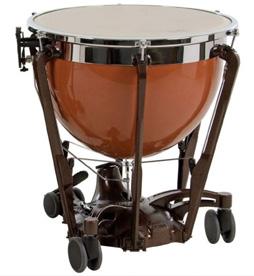
Percussion is anything that you can strike or shake to make sound. The timpani (also called kettle drums) has been in the symphony for centuries. They are usually located behind or to the side of the rest of the orchestra. Other percussion instruments have slowly joined over the years as composers look for more colorful sounds.
TUBA
The tuba is the largest and deepest brass instrument. The bell faces upward toward the ceiling. You can usually spot the tuba near the trombones and low stringed instruments.
HARP
Although not always a part of the symphony, the harp adds beautiful, sweeping colors to the orchestral sound. The harp is usually seated near (or even in) the violin sections.

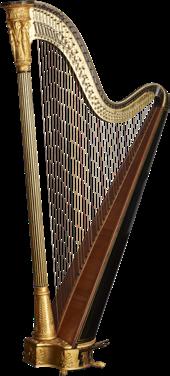
VIOLINS
The highest instruments in the strings family, the violins are the largest group on stage. They are typically divided into first and second violins and are seated immediately to the conductor's left.

VIOLAS
The violas are slightly larger and deeper sounding than the violins. They sit in the middle of the stage in front of the flutes or to the conductor's immediate right.


CELLOS
The cellos have an enormous range, sometimes playing the bass line and sometimes the high melody. Like the violas, the cello section is usually seated to the conductor's right.
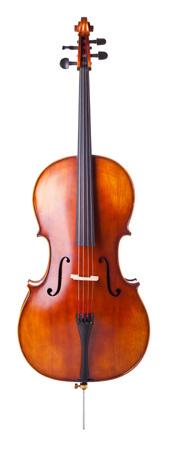
BASSES
The largest and lowest instrument in the string family, the basses are so big that musicians typically stand to play them. They are usually positioned behind the cellos and near the tuba.
28 Spartanburg Philharmonic

We are proud to support the Spartanburg Philharmonic. Merrill Lynch, Pierce, Fenner & Smith Incorporated (also referred to as “MLPF&S” or “Merrill”) makes available certain investment products sponsored, managed, distributed or provided by companies that are affiliates of Bank of America Corporation (“BofA Corp.”). MLPF&S is a registered broker-dealer, registered investment adviser, Member SIPC and a wholly owned subsidiary of BofA Corp. Investment products: Are Not FDIC Insured Are Not Bank Guaranteed May Lose Value The Bull Symbol and Merrill are registered trademarks of Bank of America Corporation. CFP Board owns the marks CFP®, CERTIFIED FINANCIAL PLANNER™, and CFP® (with plaque design) in the U.S. © 2022 Bank of America Corporation. All rights reserved. MAP3559256 | AD-06-22-0025 | 470974PM-1021 | 06/2022 V.C. “Chip” McLeod, CFP® Senior Resident Director 864.596.5474 chip_mcleod@ml.com Merrill Lynch Wealth Management 295 East Main Street Spartanburg, SC 29302 fa.ml.com/mcleod You step up when it matters most
Nadège Foofat

When you were a kid you dreamed of __________, and how does that shape who you are today?
I was drawn to music at a very young age, and started violin at 3 and piano at 4 after begging my mother for about a year! I attended my first orchestral and opera concerts at 6, and knew the moment I saw a conductor that I wanted to conduct as well. Today I divide my time between conducting and playing chamber music.
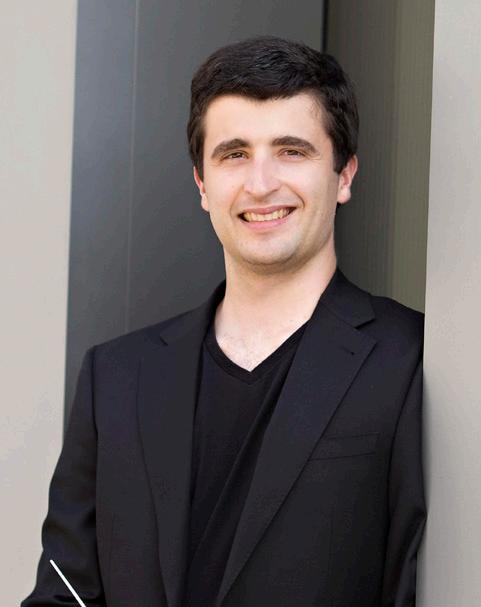
Who do you spend the most time with when you are not on the podium? (Someone outside of the music world?)
I spend the most time with my son, and I am so grateful to be able to do so.
Of all of the places you have hiked/explored, what is your favorite and why?
My husband and I hiked and camped Acadia and the Maritime provinces of Canada on a six -week camping and hike trip a few years ago. Newfoundland had parts that were like hiking an alternate planet! It’s definitely a trip I’d recommend.
If you could go back and give yourself a pep talk for the first time you performed in front of an audience, what would you say?
When I was a child I actually suffered from paralyzing stage fright. It took me until I was in my early teens to master those emotions. If I could go back, I’d tell myself to keep breathing and enjoy myself.
What piece of classical music would be the “theme song” to your life right now? Why?
I happen to be on a high speed train in Europe while I am writing this, so, Short Ride in a Fast Machine!
Jacob Joyce
What experience inspired you to be a musician and/or conductor?
I was actually inspired by a movie that I saw as a young child called From Mao to Mozart, a documentary about the famous violinist Isaac Stern’s trip to China after the Cultural Revolution. I was too young to have any real idea what was going on in the movie itself, but I loved the sound of the violin so much that I asked my parents to sign me up for lessons!
South Carolina is home to both the beach and the mountains. If you had to pick one, what would you choose?
Definitely mountains, no question! I love hiking and biking, so almost all of my vacations are spent in some mountainous region. I can get behind shorter trips to the beach, but if I had to pick one, mountains all day.
5 QUESTIONS FOR OUR GUEST CONDUCTORS
30 Spartanburg Philharmonic
Lee Mills
If you could go back and give yourself a pep talk for the first time you performed in front of an audience, what would you say?
People aren’t there to judge you. They’re there to be moved by you. So stop worrying about what could go wrong and focus on wonderful impact your music making will have on those people’s lives.
The Spartanburg Music Trail celebrates great music makers from our community. If you could make a “Music Trail” for your current city, who would be the top two musicians on your list?
I’ve just moved to Santa Barbara, CA, so I’m still learning about the music scene here, but it would be a crime not to mention Katy Perry and Jack Johnson, who are both from Santa Barbara and have each made huge contributions to music.
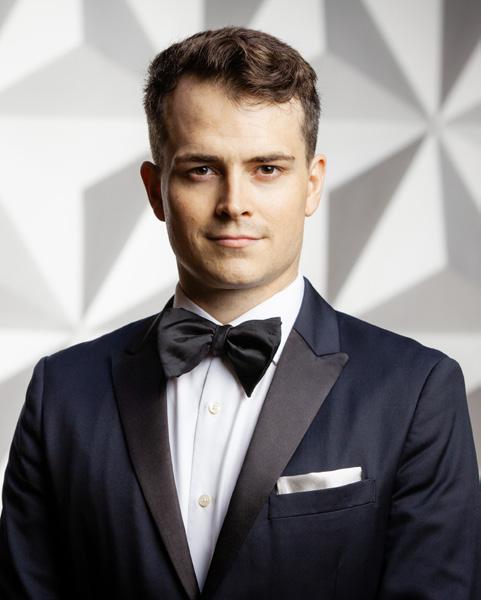
What piece of classical music would be the “theme song” to your life right now? Why?
With all the chaos of the pandemic, a recent move, and other things in my life right now, I feel like my theme song is probably the overture to “Candide” by Leonard Bernstein.
What words or phrases do you use too often?
I’m told I use the word exciting way too often. People think that it diminishes the significance of the word, but I’m not using it as a generic blanket word to describe anything I find interesting – it’s just that I truly find a lot of things in my life to be exciting!
One piece of music you can’t live without is: The Marriage of Figaro, and one piece of music you could be fine with never hearing again is: Mahler’s Symphony no. 6.
If you could go back and give yourself a pep talk for the first time you performed in front of an audience, what would you say?
I heard Sir Simon Rattle once say that Maestro Haitink had told him when he was younger: “How good do you want it to be? Just be as good as you are and accept that”. That’s the piece of advice I would give my young self. Fretting about it doesn’t make you better; for better or for worse, you are only as good as you are right now. Just accept that and keep practicing so you keep getting better.
In Spartanburg we like to drink sweet tea and walk on the Dan. How would you fill in these blanks for your hometown?
In my hometown of Ann Arbor, we like to eat Zingerman’s Deli, unequivocally the best deli in the country, and walk in the arboreteum, a big and beautiful park in the center of the town.
If we took you out for karaoke, what would be your go-to song?
I’m terrible at karaoke, both because I am a horrible singer but also because my pop music knowledge is severely lacking, but my go-to song is always Livin’ on a Prayer by Bon Jovi.
5 QUESTIONS FOR OUR GUEST CONDUCTORS
31 HearHere: Spring 2023
Sept. 18, 2021
Kayoko Dan
Dan currently serves as the Music Director of the Chattanooga Symphony & Opera, a position she's held since 2011. A versatile conductor, Kayoko Dan is active in the fields of orchestra, ballet, and opera. The Spartanburg Philharmonic was excited to open the MD Search with such an auspicious candidate, welcoming her to the podium for our first concert of the 2021/22 Season.

Mar. 5, 2022
Kelly Corcoran
Named “Best Classical Conductor” in 2015 by the Nashville Scene, Kelly Corcoran is a passionate advocate for the robust place of classical music in our lives and the lives of future generations. Corcoran is Artistic Director of Intersection, a contemporary music ensemble dedicated to challenging the traditional concert experience with concerts for all ages.


Sept. 24, 2022
Antoine Clark
Rescheduled: March, Link Up
(see page 63)
Award-winning conductor, Antoine T. Clark, has been praised for his engaging stage presence and advocacy for arts education. He has been the assistant conductor at the Gateways Music Festival with the Eastman School of Music since 2017. A supporter of new music, Mr. Clark regularly commissions new works and engages artists to create dynamic programming that inspires, fosters music education, and establishes relationships between artists and communities.
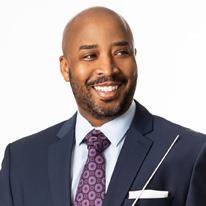
Dec. 10-12, 2021 & Dec. 9-11, 2022
Geneviève Leclair
Geneviève Leclair is an Assistant Professor at Berklee College of Music who holds a Doctor of Musical Arts degree in Orchestral Conducting from Boston University. Leclair also received her Bachelor’s and Master’s degrees in flute performance at Université de Montréal. She has been teaching at Berklee since 2016 and acts as an active guest conductor with organizations across Canada, the U.S., and the UK.
Apr. 23, 2022
John Young Shik Concklin
As a conductor, Concklin is praised for his clear beat, strong sense of rhythm, inviting gravitas, and innovative mind. John currently serves as Conductor with the Atlanta Music Project and Piedmont Chamber Orchestra. He was recently appointed Music Director of the Hendersonville Symphony Orchestra (beginning fall 2022), and made his return to the Spartanburg Philharmonic after an acclaimed debut in 2018.

MUSIC DIRECTOR SEARCH: TIMELINE
32 Spartanburg Philharmonic
Feb. 11, 2023
Nadège Foofat
Conductor, violinist, and violist; Nadège Foofat is an advocate of innovation. Foofat was honored by the League of American Orchestras in 2018 for her experience, talent, leadership potential, and commitment. She earned her Master of Music degree from the Yale University School of Music, and also a Bachelor of Music degree from The Juilliard School in viola performance.
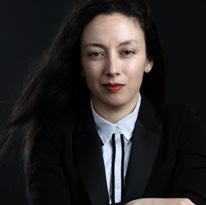
(read more on page 41)
Apr. 22, 2023
Jacob Joyce
Jacob Joyce is a young conductor who’s quickly gained recognition as a dynamic and innovative presence on the podium. Joyce studied Orchestral Conducting with Hugh Wolff at the New England Conservatory. He has also received instruction at the Tanglewood Music Center and the American Academy of Conducting at Aspen.

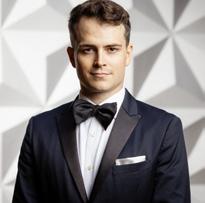
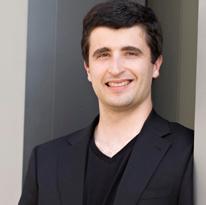
(read more on page 59)
Nov. 5, 2022
Troy Quinn
Troy Quinn is a highly acclaimed musician and conductor who has been applauded for his energetic and riveting, yet sensitive conducting. An advocate for education, Quinn has participated in numerous masterclasses as a conducting fellow, attending conducting institutes at the Royal Academy of Music, Eastman School of Music, and Bard Conservatory of Music.
Mar. 25, 2023
Lee Mills
Lee Mills is internationally recognized as a passionate, multifaceted, and energetic conductor. Mills received his Graduate Performance Diploma and Artist’s Diploma in Orchestral
Conducting at the Peabody Institute. An avid advocate for the arts, Mills has brought classical music to thousands of new listeners through performances in contrarian settings.
(read more on page 51)
May 2023
Stay Tuned!
In May of this year, the Spartanburg Philharmonic will host an event to announce the NEW MUSIC DIRECTOR. Stay tuned for more details...
Learn more:
?
MUSIC DIRECTOR SEARCH: TIMELINE
33 HearHere: Spring 2023
Meet Joanna Mulfinger
Joanna Mulfinger is a native of Greenville, SC. She graduated from Bob Jones University and continued her education at the Peabody Conservatory in Baltimore, MD, receiving a Masters Degree under the tutelage of renowned Russian pedagogue Victor Danchenko. While at Peabody, she was awarded the J.C. van Hulsteyn Prize for Outstanding Musical and Academic Contributions. She has pursued additional summer music studies at the Juilliard School in New York, the Hanns Eisler Hochschule Fur Musik in Berlin, Germany, and other festivals in France, Italy, Germany, Switzerland, and Canada. Since returning to Greenville she has developed a large studio of private students, and has been on the faculty of several local universities.
Joanna appreciates learning about all kinds of music. In 2016 she learned and performed a new work for erhu, a stringed instrument of Chinese origin. And, in 2017, as a result of her interest in Baroque violin playing, she started a Baroque String Ensemble at Anderson University, which she led for four years. Professionally, she has performed with Baroque ensembles, including The Sebastians in New York and New Jersey, and is currently a member of Early Music New York.
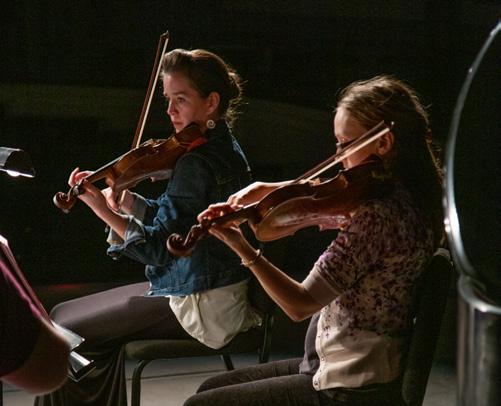
Joanna is active at the Peace Center in Greenville, where she enjoys playing with National Tours of Broadway shows such as Disney’s Lion King, Chicago, Phantom of the Opera, My Fair Lady, White Christmas, Something Rotten, Motown, Newsies, Porgy and Bess, The Producers, Young Frankenstein, Evita, West Side Story, and Wizard of Oz, among others. She is also in demand to accompany local performances of popular touring artists such as Smokey Robinson, Celtic Woman, Trans-Siberian Orchestra, Josh Groban, Mannheim Steamroller, Anne Murray, Wayne Newton, and Johnny Mathis.
As a chamber musician, Joanna is a member of several local ensembles including the Mulfinger String Quartet, Trio Tapestry (guitar, cello, violin), Tryptich Musica (piano, horn, violin), and Steve Eager and Friends, a band that covers pop and Broadway tunes.
She is an active orchestral musician. From 2007-2019 she was Assistant Concertmaster and then Concertmaster of the Spartanburg Philharmonic and returns in 2022 as Interim Concertmaster. She has been Principal Second Violin of the Greenville Symphony Orchestra since 2003.
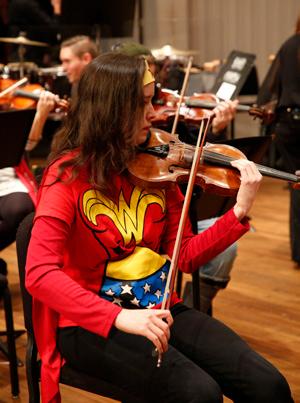

Joanna performs on a 1653 Nicolo Amati violin, a violin she inherited from her mother.
 Interim Concertmaster
Interim Concertmaster
OUR MUSICIANS 34 Spartanburg Philharmonic
Spartanburg Philarhmonic
Orchestra Members & Chair Sponsors
as of August 2022
Violin I
Joanna Mulfinger, Concertmaster
Endowed by the Dr. Jerrie Lucktenberg Concertmaster Endowment
Courtney LeBauer, Associate Concertmaster
Mr. & Mrs. George Dean Johnson
Mary Irwin
Dr. Barry Bodie & Ms. Laurel D. Johnson
Robin Hague Els
Ms. JoAnn Bristow
Amanda Gentile
Mr. & Mrs. Geoffrey Wilson
Christine Hallett-Penney
Mr. & Mrs. Ray Dunleavy
Kathleen Robinson
Mr. & Mrs. David Ellis
Ivana Carlson**
Allana Farmer**
Violin II
Ashley Horvat, Principal
Mr. & Mrs. Roger Habisreutinger
Simone Beach, Assistant Principal
Ms. Laura Henthorn
Ann Buttimer
Laura Allen & Roger Sullivan
Michele Tate Cockram
Mr. E.T. McLean, in memory of Henry Janiec
Theresa Jenkins-Russ*
Mr. & Mrs. Wiley North
March Moody
Col. & Mrs. Robert N. Maddox
Helen Tipton
Dr. Melinda Moretz
Emily Riesser
Mr. & Mrs. Walter Sunderlin
Adriana Stamile**
Viola
Alvoy Bryan Jr.*, Principal Endowed by friends and family in honor of Wallace Eppes Johnson
Arthur Ross, Assistant Principal
Mr. James Cheek
Diana Maley Berti*
Mr. Peter Grzan
Emma Smoker
Mr. & Mrs. Don Miles
Michael Weaver
Mrs. Jack Steinberg
Cello
Ismail Akbar, Principal
Mr. & Mrs. Stanley Baker
Kathy Foster, Assistant Principal
Lib & Rick Orr
Meredith Keen
MG(R) Edwin E. Spain, III & Mary B. Spain
Eric Scheider
Mr. & Mrs. Marshall T. Walsh
Benjamin Smith
Dr. Meisha Whitlock
Bass
Ian Bracchitta*, Principal
Mr. & Mrs. Jerry Cogan
Matthew Waid, Assistant Principal
Mr. & Mrs. Paul Lehner
Brian Gencarelli
Bob & Karen Mitchell
Rich Harbison
Jeff Stinson
Flute & Piccolo
Rhea Jacobus, Principal
Mr. & Mrs. John S. McBride, Jr.
Caroline Ulrich
Mrs. Susan H. Baker
Jennifer Dior
Oboe & English Horn
Kelly Vaneman*, Principal
Rachel & Ken Deems
Mary AllyeB Purtle
Mr. & Mrs. Halsey Cook
Clarinet
Karen Hill, Principal
Dr. & Mrs. Louis Knoepp, Jr.
Harry Hill‚ Jr.
Mrs. Angelina Eschauzier
Kyra Zhang
Bassoon
Frank Watson, Principal
Dr. & Mrs. Caleb Loring, IV
Rosalind Buda
Ms. Judy McCravy
Stephanie Lipka Rhyne
Horn
Anneka Zuehlke-King, Principal
Mr. & Mrs. Donald Wildman
Chris George
Ms. Karen E. Bjelland
Andrew Merideth*, Assistant Principal
Mr. John R. Murphy
Jeanette Schlimgen
Christopher Griffin
Darian Washington
Trumpet
Cody Beard, Substitute Principal
Karen & Stephen Parrott
Chris Imhoff, Substitute Principal
Kenneth Frick
Dr. Ohmar Land
Bruce Cox
Mr. & Mrs. Thomas P. Nederostek
Trombone
Mark Britt, Principal
Mr. & Mrs. V. C. McLeod, III
John Grodrian, Substitute Principal
Rienette Davis
Mr. & Mrs. H. Peter Theiler
Eric Henson
Tuba
John Holloway, Principal
Mr. & Mrs. William Barnet III
Timpani
Patrick Lowery, Principal
Mrs. J. Michael Kohler, Jr.
Percussion
Adena McDaniel, Co-principal
Matt McDaniel, Co-principal
Dr. Leslie W. Howard, Jr.
Del Burton
Piano
Brennan Szafron, Principal
Mr. & Mrs. Lindsay Little
Harp
Emily Waggoner, Principal
Mr. & Mrs. Kenneth Frick
OUR MUSICIANS
* Orchestra Committee Member
** Apprentice Musician
SpartanburgPhilharmonic.org/our-musicians 35 HearHere: Spring 2023
Stomach Bug/GI Issues Swimmer’s Ear Seasonal Allergies
Head Lice Tick Bites Asthma Refills UTIs Birth Control
Nail Condition Rashes & Sores
Pink Eye Minor Burns
Back Pain Whooping Cough Ringworm Tick Bites Cold er Blister Athlete’s
Can’t wait to feel better?
Connect to care now.
piPen Refills Shingles Malar
ia Prevention Flu Shot Yeast Infection Stomach Bug/GI
sues Swimmer’s Ear Seasonal Allergies Head Lice Tick
Asthma Refills UTIs Birth Control
Sores Pink Eye Minor Burns
Nail Condition Rashes
Back Pain Whooping Cough
Ringworm Tick Bites Cold Fever Blister Diaper Rash
Sickness Athlete’s Foot EpiPen Refills Canker Sores Acid
Virtual Care as little as $19
Reflux Shingles Malaria Prevention Flu Shot Yeast Infection
Stomach Bug/GI Issues Swimmer’s Ear Seasonal Allergies
Head Lice Tick Bites Asthma Refills UTIs Birth Control
Everyday health issues can ruin your day. Why wait for care? Connect online, chat, video or phone.
Nail Condition Rashes & Sores Pink Eye Minor Burns
Back Pain Wooping Cough Ring Worm Tick Bites Cold
Go to SpartanburgRegional.com/VirtualCare to start your visit now.
Fever Blister Diaper Rash Motion
Sickness Athlete’s Foot
EpiPen Refills Canker Sores Acid Reflux Shingles Malaria
Prevention Flu Shot Yeast
Infection
36
Allergies
Control UTIs Burns
Cold Athlete’s Foot
Malar-
Bug/GI Is-
Heart, Soul, & Cello
Tick Bites
February 11, 2023
7:00 PM
Rashes & Cough
Nadège Foofat
Rash Motion
Sores Acid
Infection
Allergies
Control UTIs
Burns
Program Online:
Cold Athlete’s Foot
Malaria
Edward Elgar
for Violoncello in E minor, op. 85
Claire Bryant, cello

I. Adagio; Moderato
II. Lento; Allegro molto
III. Adagio
IV. Allegro; Moderato; Allegro, ma non troppo
I. Scherzo: Sehr mässig
I. Nicht schnell
I. Feierlich
I. Lebhaft
ABOUT THE MUSIC
Guest Conductor
subject to change. All timings are approximate. ZIMMERLI SERIES TWICHELL AUDITORIUM
blue
11 min
Programs
Jennifer Higdon
cathedral
30
Concerto
min
INTERMISSION Robert Schumann Symphony no. 3 in E-flat Major, op. 97, "Rhenish" 32 min
I. Lebhaft
37 HearHere: Spring 2023
FROM THE CONDUCTOR
This program offers a mixture of works that have eithe rnever been performed by the Spartanburg Philharmonic or have not been performed in a long time. The first piece is Higdon’s stunning blue cathedral, one of the most performed contemporary works

ABOUT THE MUSIC
today and a work that is new to this stage. The second piece on the program is Elgar’s majestic Cello Concerto featuring Claire Bryant, a South Carolina native and a person I know is familiar with the Philharmonic having performed as a soloist in 2017. Finally, we will
hear Schumann’s third symphony. Nicknamed the “Rhenish”, this piece is probably Schumann’s most celebrated symphony and will be a premiere performance for the professional Spartanburg Philharmonic.
INSTRUMENTATION
2 flutes/piccolo, 1 oboe, 1 english horn, 2 clarinets, 2 bassoons, 4 horns, 3 trumpets, 3 trombones, tuba, timpani & percussion, harp, piano, celesta, and strings
APPROXIMATE DURATION
11 minutes
Surprising though it might be to read, the art of composing is thriving in America today. In recent years a wide and diverse array of compositional voices has bridged the gap that had developed between living composers and concertgoing audiences during the decades after WWII, and music lovers have thrilled to the melody and emotional directness they encounter in so many of today’s younger composers.
There can be no doubt that Jennifer Higdon has been driving that trend for some years now. A child of the South (Georgia and Tennessee), Higdon arrived at her vocation through the paths of singing folk and rock music and playing flute in her school music programs. She eventually found her way to Philadelphia, where she completed her studies at the University of Pennsylvania and, eventually, chaired the Composition department at the Curtis Institute of Music. A Pulitzer and three Grammy Awards are among her many honors; her music’s pairing of a wide-ranging, post-avant-garde tonal and textural palette with singable melodies and directly emotional harmonies has made her a favorite of audiences and critics alike.
BIOGRAPHY FOR JENNIFER HIGDON:
Jennifer Higdon is one of America’s most acclaimed figures in contemporary classical music, receiving the 2010 Pulitzer Prize in Music for her Violin Concerto, a 2010 Grammy for her Percussion Concerto, a 2018 Grammy for her Viola Concerto and a 2020 Grammy for her Harp Concerto. In 2018, Higdon received the prestigious Nemmers Prize from Northwestern University which is awarded to contemporary classical composers of exceptional achievement who have significantly influenced the field of composition. Most recently, she was inducted into the prestigious

blue
(1962-)
- Nadège Foofat
cathedral Jennifer Higdon
COMPOSED 1999
38
American Academy of Arts and Letters. Higdon enjoys several hundred performances a year of her works, and blue cathedral is today’s most performed contemporary orchestral work, with more than 700 performances worldwide. Her works have been recorded on more than
sixty CDs. Higdon’s first opera, Cold Mountain, won the International Opera Award for Best World Premiere and the opera recording was nominated for 2 Grammy awards. Her music is published exclusively by Lawdon Press.
blue cathedral continued
retired Major-General – was so scandalized that they disinherited and cut off relations with the couple.
Photographs of Sir Edward Elgar present what appears to be the absolute archetype of the Edwardian English ruling class: a vast, rounded dome of a forehead, an imperious brow, a hawklike nose, and a mustache of a size and impressiveness that seem to defy the laws of both human anatomy and gravity. And the utter ubiquity of his Pomp & Circumstance March No. 1 at graduation ceremonies – the most formal activities in many Americans’ lives – reinforces his image as the embodiment of the British empire at its most dominant.
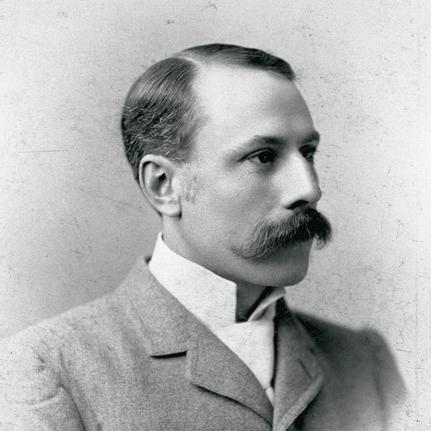
But, as is so often the case with these things, our preconception is almost entirely wrong. Elgar was Roman Catholic, the son of a humble small-town organist, and never studied at a prestigious London conservatory. Most of his music, far from being pompous or stuffy, displays an emotionalism and formal innovation more akin to Wagner than to, say, Sir Arthur Sullivan. And when he did marry into the upper class, the family of his new father-in-law – a
Elgar’s eventual recognition by the British and then worldwide audiences didn’t come till he was 42, with the 1899 premiere of the Enigma Variations. From that point he rode a wave of popularity that coincided with the golden, twilight years of the British empire and was ultimately dashed on the rocks of World War I. That conflict, which killed well over a million Britons and sparked Britain’s long decline as an imperial power, decimated British cultural life and turned musical tastes towards the unsentimental energies of Jazz and popular music and the equally unsentimental dissonances of Modernism. By 1919, when the Cello Concerto was written and premiered, Elgar’s unabashed Romanticism seemed to many a thing of the past.
The Cello Concerto is undoubtedly Elgar’s last great work, and it’s hard not to think that Elgar may have known that as he wrote it. In its lush, expressive harmonies, in its nakedly emotional melodies, and in its utterly free approach to form, it could have been written by innumerable composers from across Europe in much of the 19th Century; but in its alternation of melancholy mourning and bucolic joy, in its evocation of beautiful memories unsullied by the mawkishness of nostalgia, Elgar’s work could only be that of an Englishman at the height of his powers, looking back over a life –and, indeed, a way of life – soon to pass from the Earth.
Concerto for Violoncello Edward Elgar (1857-1934)
COMPOSED
1919
INSTRUMENTATION
2 flutes, 2 oboes, 2 clarinets, 2 bassoons, 4 horns, 2 trumpets, 3 trombones, 1 tuba, timpani, and strings APPROXIMATE
16 minutes
ABOUT THE MUSIC
DURATION
39 HearHere: Spring 2023
Symphony no. 3 “Rhenish” Robert Schumann (1810-1856)

COMPOSED 1850
INSTRUMENTATION
2 flutes, 2 oboes, 2 clarinets, 2 bassoons, 4 horns, 2 trumpets, 3 trombones, timpani, and strings
APPROXIMATE DURATION
32 minutes
Speaking of Romanticism, we’d be hard-pressed to find a better avatar of that aesthetic (and, indeed, that mindset and that lifestyle) than Robert Schumann. Schumann was as well known in his lifetime for his articulate and even poetic writing, for his one great love affair, and for his moods and melancholy and eventual madness as he was for his powerfully emotional music.
Initially trained as a lawyer, Schumann was inspired by the powerful performances of Paganini and Liszt to pursue serious piano study with the celebrated pedagogue Friedrich Wieck. Never one to do things halfway, Schumann practiced obsessively, even contriving a mechanical device that would strengthen his fingers even as he did other things; within a couple years he had injured his hand so badly he had to give up performing. But even as he was destroying his own manual dexterity, Schumann’s verbal dexterity was driving a career in music criticism that would soon make him among the most respected critics and public intellectuals in Germany. And he was beginning a romance with Wieck’s daughter, the brilliant teenage piano prodigy Clara.
It was in part Wieck’s efforts to keep the two lovers apart that drove Robert’s composition career: if he couldn’t be with Clara in the flesh, he could at least compose for her, and his first great solo-piano works of the 1830’s display his love for her even as they contain hidden messages tucked into their melodies and harmonies. Finally, in 1840, the 21-year-old Clara was able to win a highly public legal battle with her father and marry Robert.
Over the next 14 years the couple had eight children, Clara performed incessantly to make money for the growing family, and Robert experienced bouts of crippling depression that alternated with manic periods of extraordinary compositional energy. By 1854 his psychological
distress was acute, and he experienced auditory hallucinations that, for a composer, were torturous: he heard original symphonies in his head, in their entirety – but he couldn’t pause them, which meant that he was unable to write any of them down. He attempted suicide that same year, throwing himself into the Rhine, only to be fished out and institutionalized for the remaining two years of his life. Clara’s visits caused him such anguish that his doctors forbade them, and the two were able to join hands just once more, in the hours before Robert died.
It’s more than a little ironic that the same river Schumann threw himself into was the one that had inspired his most popular and appealing symphony just a few years before. In 1850 he was named Music Director in the Rhineland city of Düsseldorf, and while his tenure there was short and unhappy, it produced the third (and last to be written) of his four symphonies in tribute to the region and the river. The Rhenish symphony captures the sights and sounds as the wide river rolls through the landscape, from the fields and forested hills to (in the fourth of its five movements) the splendor of the cathedral at Köln, culminating in a joyous finale.
Chris Vaneman Contributing Author
ABOUT THE MUSIC
40 Spartanburg Philharmonic
Nadège Foofat
GUEST CONDUCTOR & MUSIC DIRECTOR FINALIST
Conductor, violinist, and violist; Nadège Foofat is an advocate of innovation in thought, action, music, and culture. In 2018, Nadège was one of six conductors selected for the Bruno Walter National Conductor Preview for her “experience, talent, leadership potential, and commitment to a career in service to American orchestras” by the League of American Orchestras.

A champion of equal representation for women in orchestral programming, Nadège’s concerts have included works by Amy Beach, Jennifer Higdon, Mary Howe, Vítězslava Kaprálová, and several other female composers of merit. She is a leading expert on the orchestral works of the early romantic French composer, Louise Farrenc. Nadège is also a member of the Executive Council of the Institute
Claire Bryant
GUEST ARTIST, CELLO
Claire Bryant is a cellist, teacher and activist, whose passion and commitment shine brightly through all of her work. A sought-after and distinctive performer, Claire has collaborated with such master artists as Emanuel Ax, Sir Simon Rattle and Dawn Upshaw, and worked closely with luminary composers from Meredith Monk to Steve Reich to Herbie Hancock. Over the past 25 years, she has enjoyed a prominent solo career, appearing with major orchestras around the world including the Spartanburg Philharmonic, Finland’s Kuopio Symphony Orchestra and The National Symphony of Honduras.
Claire is a co-founder of Decoda, Carnegie Hall’s Affiliate Ensemble, and director of its initiative Music for Transformation, a criminal justice
for Composer Diversity. She earned her Master of Music degree from the Yale University School of Music, and also a Bachelor of Music degree from The Juilliard School in viola performance.
In 2014, Foofat served as associate conductor for the Naxos recording of Darius Milhaud’s L’Orestie d’Eschyle, which was nominated for a 2015 GRAMMY® Award (Best Opera Recording). From 2009-2014, Nadège was the Founder and Music Director of the Esopus Chamber Orchestra, a twenty-five-member award-winning professional chamber orchestra based in the Hudson Valley, New York.
www.NadegeFoofat.com
program which brings collaborative songwriting workshops to incarcerated communities. In this capacity, she was invited twice to share Decoda’s work with the Obama administration in the White House. In 2019, Claire returned to her native South Carolina to join the University of South Carolina School of Music’s faculty, where she enjoys a robust studio of talented young cellists. She is the coordinator of Bridging Our Distances, the community engagement arm of the School of Music, and is the director of The Collective, a graduate ensemble dedicated to creative and innovative community performances and programming. www.ClaireBryant.com

ABOUT THE MUSIC ABOUT THE MUSICIANS
41 HearHere: Spring 2023




The Local Hiker www.TheLocalHiker.com 173 E. Main Street Spartanburg, SC (864) 746-1651 HOURS: Mon. – Fri. 10am to 7pm Sat. 9am to 7pm Sunday Closed
Oolong Notes
FRIDAY
Feb. 17, 2023
5:30 PM Social Hour
6:30 PM One-hour Concert
@ Chapman Cultural Center
An Exotic Serenade For Lovers

Info & Tickets:
A post-Valentine’s Day date night to keep loves’ fires burning all week long. Travel with us to the exotic East on the strings of Jennifer Chang’s guzheng, the 21-string Chinese zither. A master of her instrument, Jennifer will mesmerize and delight with a blend of eastern and western classical pieces. One of the highlights of the concert program is a movement from Chinese composer He Zhanhao’s Butterfly Lovers Concerto, a poignant, musical retelling of the ancient Chinese legend. Steeped in history and folklore, Oolong Notes is an undoubtedly rich blend of eastern and western classical pieces.

Jennifer studied traditional Chinese music and gu zheng performance with grandmasters in China. As a gu zheng soloist, she is in demand worldwide as a teacher
and performer. In addition to solo appearances in Japan, Korea, Taiwan, and Hong Kong, she has performed as a soloist for the Emperor of Japan and former President Bill Clinton. Since moving to the U.S. in 2001, she has appeared as a soloist with the Raleigh Civic Symphony and Chamber Orchestra, premiering works such as “ Voices of Asia and the Pacific,” “Creatures – Scenes & Fairytales,” “Around the World,” and “China Dream –Tradition & Technology.” During the 2007 season, Ms. Chang was featured as a soloist performing the Butterfly Lovers Concerto with the North Carolina Symphony under the baton of Grant Llewellyn. Her performance was lauded as “one of the season’s most enjoyable concerts” by Roy C. Dicks of the Raleigh News and Observer.
ESPRESSO SERIES CHAPMAN CULTURAL CENTER
43 HearHere: Spring 2023








.org free admission. small museum. big art. image: Untitled (The Gathering) by Helen DuPré Moseley Femina | 7.21 - 10.31.2022 @BELLAVISIONEYES BELLA-VISION.COM | (864) 308-8812 MON-THURS 8:30 AM - 5 PM | FRI 8:30 AM - 4:30 PM New Location Opening This Fall! 142 Fernwood Drive Request an Appointment! Janet M. Wilson, OD, FCOVD Owner + Optometrist Exceptional Eye Care & A Luxury Optical Experience
Fiddle Frappé
FRIDAY
Mar. 17, 2023
5:30 PM Social Hour
6:30 PM One-hour Concert
@ Chapman Cultural Center
Revelry And Reverence On Tap


Info & Tickets:
This St. Patrick’s Day, heed the violin’s siren song and join us for an evening of traditional fiddle tunes and folk melodies from Norway, Sweden, Scotland, Ireland, and more. Discover with us the old-world sounds of the fiddle as arranged and popularized by the Danish String Quartet. Let your feet tap and dance along as our string ensemble plays tribute to the iconic, lilting sounds of the Emerald Isle. As a concert, Fiddle Frappé is a rollicking, whippy blend of music highlighting the folksy, dulcet tones of the string quartet. Mystical, evocative, and a heck of a lot of fun!
The concert also features guest soloist Andrew Carlson, Instructor of Violin and Conductor of the Furman University Symphony Orchestra, and a “Demon Fiddler,”
according to a New York Times Music Review. Carlson received his MM and BMUS from the University of Georgia and his DMA in Performance and Pedagogy from the University of Iowa. He has served as a faculty member at Morehead State University and served on the faculty of Denison University through the 2017–2018 academic year. In 2000 Carlson started a Bluegrass program at Denison University, and the university now allows music majors to have a concentration in Bluegrass. Carlson also has his own band, The Andy Carlson Band, that performs music ranging from traditional Old-Time Appalachian, Bluegrass, Swing, Blues, “New” Grass, Classical, and Contemporary Acoustic.

ESPRESSO SERIES CHAPMAN CULTURAL CENTER
45 HearHere: Spring 2023




46 TO THEATRE, ART AND MUSIC! Where thought leads The Rosalind Sallenger Richardson Center for the Arts WOFFORD.EDU/ARTS LAWSON ACADEMY OF THE ARTS Discover more! converse.edu/LawsonAcademy Instrumental Lessons Vocal Lessons Musikgarten Dance Classes Childbloom© Guitar
Arvo Pärt
in Memory of Benjamin Britten
Conrad Tao
Tao of Purity & Power
March 25, 2023
7:00 PM
Lee Mills
min

Conrad Tao, piano
Part 1.
a. breakable gaps
b. awkward didact
Part 2.
a. earnest build
b. euphoria assault
I. Andante - Allegro con anima
II. Andante cantabile con alcuna liicenza
III. Valse: Allegro moderato

IV. Finale: Andante maestoso - Allegro vivace
Program Online:
Programs subject to change. All timings are approximate.
ABOUT THE MUSIC
Guest Conductor
ZIMMERLI SERIES TWICHELL AUDITORIUM
Cantus
6 min
32
An Adjustment
Tchaikovsky Symphony no. 5 in E minor, op. 64 44 min
INTERMISSION Piotr Ilyich
47 HearHere: Spring 2023
This program is about the different ways in which composers explore sonority to create music. The first piece, Cantus in Memoriam Benjamin Britten, by Arvo Pärt really has, at its core, only two elements: The chime, representing the funeral bell toll, and a descending A-minor scale played by the strings at different speeds. As the different instruments play the descending scale at varying speeds, the notes interact with each other, creating incredibly beautiful harmonies. With little rhythmic drive, the scales pour over one another creating a sense of stasis one feels upon hearing such devastating news as the passing of a friend.
This simple idea becomes overwhelming and beautifully represents the emotion of loss the composer felt at the death of one of his most respected colleagues.
In Conrad Tao’s piece “An Adjustment,” we hear how rhythm can be the driving force of a piece. Conrad was inspired by the sounds of a night club and how the DJ creates intricate rhythms through overlapping two separate pieces of music simultaneously. This is an energetic, pulsing tour de force for the orchestra and the pianist, and it shows off how rhythm is an essential tool for creating a sense of drive and motion in a piece.
Cantus in Memory of Benjamin Britten Arvo Pärt
In the Soviet Union once, I spoke with a monk and asked him how, as a composer, Once can improve oneself. He answered me by saying he knew of no solution. I told him that I also wrote prayers, and set prayers and the texts of psalms to music, and that perhaps this would be of help to me as a composer. To this he said, “No, you are wrong. All the prayers have already been written. You don’t need to write any more. Everything has been prepared. Now you have to prepare yourself.”
Thus writes Arvo Pärt, in explaining his own approach to music and life; if it sounds a little mystical to you, let’s just say that you’re not alone. Pärt has for many years been driven by his intense and very personal Christian faith, forging his own path with a unique and most individual approach to his art. Over the course of decades, he has won the respect of critics and academics and, more important, the deep affection of audiences: from 2011 to 2018 he was the world’s most-performed living composer, yielding that position in 2019 to no less a figure than John Williams.
In Tchaikovsky’s “Symphony No. 5,” we have a piece that is driven primarily by melody and is completed by the harmonic interactions and rhythmic drive that were given more prominent roles in the first two pieces on the program. Beautiful phrases, melodies, and countermelodies interact with each other to propel the piece forward, and through intentional alteration of melodies, harmonies, and rhythm, Tchaikovsky created an epic, 45-minute emotional journey that is cohesive and impactful.
- Lee Mills
Pärt is a citizen and the best-known export of Estonia, the tiny country on the Baltic Sea that between 1940 and 1991 was subsumed by the USSR. He spent much of the 1960’s battling Soviet censors because he insisted on using a Serialist approach to composition, turning out music in the hyper-mathematical, dissonant style introduced by Arnold Schoenberg. A conversion to Orthodox Christianity in 1972 led to a four-year period of artistic silence, and when he returned to composition in 1976 it was with music that could hardly have been more different. Gone were dissonance and extreme complexity, and in their place was a meditative

ABOUT THE MUSIC
ABOUT THE MUSIC
(1935-) COMPOSED 1977 INSTRUMENTATION strings and percussion APPROXIMATE DURATION 6 minutes
FROM THE CONDUCTOR 48 Spartanburg Philharmonic
simplicity akin to the chant of monks. The Soviet authorities weren’t much friendlier, however, since he was open about his music’s explicitly religious inspiration, and he shortly defected to Germany. After Estonia regained its independence, he finally moved back, and he remains his country’s most famous citizen.
Begun immediately after the illustrious British composer Britten’s death in December of 1976, the Cantus in Memory of Benjamin Britten was among the works Pärt broke his silence with in 1977. It uses the very simplest of musical materials – an A Minor chord and a descending A minor scale (aka, the white notes on the piano keyboard) to enormously powerful effect.
That, in a sense, is what you need to know about this piece. I could instead have told you this story, which in another way tells you all you need to know: In the Fall of 2001, my wife and our friend Scott Robbins were young music professors a few years into their Converse careers. On September 12 they both had scheduled classes full of shocked and grieving students. Both of them – independently and without being aware of the other’s plans –brought to class their own CD’s of the Cantus, played the piece for their students, and, after sitting in silence for some minutes, sent everybody home.
Regarding his piano concerto, An Adjustment, Conrad Tao offers this list to describe what the piece is about:
• The way that depression sometimes makes every single minute detail, choice, and experience feel huge, almost melodramatic in scope; the way it simultaneously renders all those hyper-saturated details, choices, and experiences numbing; the harrowing, contradictory space between numbness and nigh-operatic feeling.
• Remaining professional and disciplined while in a strange, adrift, suspended state of mind; the curious tension that results.
• Dotted eighth notes; specifically, at least in “euphoria assault,” the way dotted eighth
notes interact with a quarter-note pulse in so much electronic dance music and modern EDM-inflected pop; the weirdly beautiful way the resultant polyrhythms fall apart and come together.

The piece is in two parts, each with two sections:
The first part fumbles around, trying to find solid ground. “breakable gaps” keeps trying to build to cohesion but repeatedly fails; “awkward didact” struggles to maintain its rhythmic integrity.
The second part starts from a place of acknowledgment and expands the sound palette to include electronics. “earnest build” narrativizes, almost romantically, the accretive process of emerging from a depressive hole; “euphoria assault” is the complicated, uneasily bombastic result of that accretion.
An Adjustment Conrad Tao (1994-)
COMPOSED 2015
INSTRUMENTATION
2 flutes/piccolo/alto, 2 oboes, 2 clarinets, 2 bassoons/ contrabassoon, 2 horns, 2 trumpets/piccolo, timpani, strings, and electronics
APPROXIMATE DURATION
32 minutes
An Adjustment was commissioned by Dirk Brossé, Music Director, and Janelle McCoy, Executive Director, for The Chamber Orchestra of Philadelphia. Underwriting for this commission was, in part, by The Presser Foundation, The Musical Fund Society of Philadelphia, and The Archie W. and Grace Berry Foundation.
ABOUT THE MUSIC
. . .
49 HearHere: Spring 2023
Cantus continued
Symphony no. 5 Piotr Ilyich Tchaikovsky (1840-1893)
COMPOSED 1888
INSTRUMENTATION
3 flutes/piccolo,
oboes,
bassoons,
APPROXIMATE DURATION
44 minutes
There are, essentially, two ways to write program notes. The first (or, as I think of it, the “boring”) way is to deliver a theoretical analysis of each piece, listing key areas and structural plans. The second (“less boring”) way is the historical one, telling stories that illuminate a bit about each piece and hopefully preparing the reader to encounter it. The thing about history, though, is that the stories we share often reveal as much about ourselves, our own priorities and obsessions, as they do about actual history.
Readers need look no further than the “Tchaikovsky” entry in the fifth edition of the New Grove Dictionary of Music and Musicians for proof. New Grove is the most respected multi-volume reference work on musical subjects; every 25 years or so a brand-new, entirely updated edition is published. The fifth of these, which appeared in 1979, prints as fact a story about Tchaikovsky’s death, that – were it true – would surely be the most sensational demise of any composer.
Earlier in the decade a Russian émigré musicologist published a paper that, citing an overheard deathbed confession that in turn cited a second, decades-old deathbed confession, claimed that Tchaikovsky had not died of cholera as had previously been believed but had poisoned himself with arsenic. The story went that the composer had been caught in flagrante with a young nephew of the Romanoff family; before the liaison was made public, a secret “honor court” made up of Tchaikovsky’s former military school classmates gave the composer two options: a dignified suicide, or public scandal and exile to Siberia. In this tale, Tchaikovsky chose the former, and his physician, who was in on the conspiracy, supplied him with the poison. That so wild a tale could be published as fact in the New Grove, despite the conspicuous lack of any shred of evidence other than a third-hand deathbed confession, tells us something about the preoccupations of the 1970’s, but even in its outlandishness it’s a testament to the composer’s tumultuous inner life.
Tchaikovsky was indeed gay, as his frank letters to his brother Modest make clear. In fact he
spent much of his adult life struggling with that aspect of his being, public acknowledgment of which would have crippled his career and maybe even jeopardized his life in Czarist Russia. He even went so far as to marry one his students, but their marriage remained unconsummated: on their wedding night the composer fled his young bride and, distraught, walked into the Moskva River. And his eventual death was, in a certain sense, self-inflicted – he drank a glass of unboiled water during a raging cholera epidemic and contracted the disease that killed him. (The 2004 sixth edition of New Grove quietly returns to that accepted story of the Composer’s death, in case you were wondering.)
Tchaikovsky was one of the most personal and emotionally direct of composers, and so his difficult inner life is indeed directly relevant to his music; you can’t exactly blame the fifth edition’s editors for wanting the composer’s demise to equal his music in drama. Next-to-last of Tchaikovsky’s six symphonies, the Fifth was written in 1888, and while it was attacked by critics, the piece was a hit with audiences and has remained in the repertoire ever since.

It opens with a pensive melody, one which the composer associated with “willing acquiescence” to the inscrutable design of fate. That melody becomes a “motto theme,” appearing, transformed, in each of the movements that follow and going out in a blaze of melancholy glory in the symphony’s Finale.
Chris Vaneman Contributing Author
ABOUT THE MUSIC
2
2 clarinets, 2
4 horns, 2 trumpets, 3 trombones, tuba, timpani & percussion, and strings
50
Spartanburg Philharmonic
Lee Mills
GUEST CONDUCTOR & MUSIC DIRECTOR FINALIST
Lee Mills is internationally recognized as a passionate, multifaceted, and energetic conductor. Named ‘New Artist of the Month’ in 2019, Mills received his Graduate Performance Diploma and Artist’s Diploma in Orchestral Conducting at the Peabody Institute. An avid advocate for the arts, Mills has brought classical music to thousands of new listeners through performances in contrarian settings.
The League of American Orchestras selected Mills for the 2018 Bruno Walter National Conductors Preview where he conducted the Nashville Symphony Orchestra, and in 2017 Mills was selected as a semi-finalist in both the Sir Georg Solti International Conducting Competition and the Opera Royal de Wallonie-Liege International

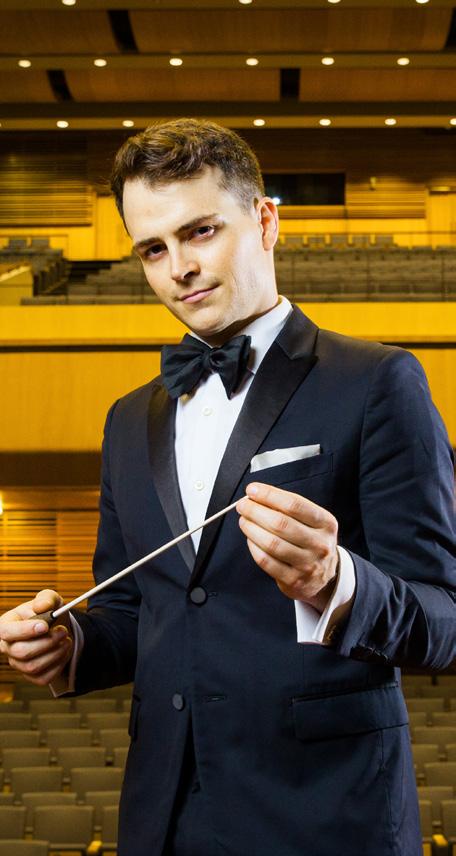
Conrad Tao
GUEST ARTIST, PIANO
Conrad Tao has appeared worldwide as a pianist and composer and has been dubbed “the kind of musician who is shaping the future of classical music” by New York Magazine, and an artist of “probing intellect and open-hearted vision” by The New York Times. He is the recipient of the prestigious Avery Fisher Career Grant and was named a Gilmore Young Artist—an honor awarded every two years highlighting the most promising American pianists of the new generation. As a composer, he was also the recipient of a 2019 New York Dance and Performance “Bessie” Award, for Outstanding Sound Design / Music Composition, for his work on More Forever, his collaboration with dancer and choreographer Caleb Teicher.
Conrad Tao has recently appeared
Opera Conducting Competition. In addition, he conducted alongside David Robertson in the highly acclaimed U.S. Premiere of John Cage’s Thirty Pieces for Five Orchestras with the Saint Louis Symphony.
Lee Mills currently acts as the associate conductor of the Seattle Symphony and winner of the Solti Foundation U.S. Career Assistance Award in 2014, 2017, 2019, and 2020. He has also led concerts with the National Symphony Orchestra (USA), the Los Angeles Philharmonic, the São Paulo State Symphony Orchestra, and several other performing groups. In 2014, Mills was also the Assistant Conductor to David Robertson for Carnegie Hall’s National Youth Orchestra of the USA.
www.LeeMillsConductor.com
as soloist with the Los Angeles Philharmonic, Cleveland Orchestra, New York Philharmonic, and Boston Symphony. As a composer, his work has been performed by orchestras throughout the US; his first large scale orchestral work, Everything Must Go, was premiered by the New York Philharmonic in 18-19 and premiered in Europe by the Antwerp Symphony in 21-22. In that same season, his violin concerto, written for Stefan Jackiw, was premiered by the Atlanta Symphony under Robert Spano, and the Baltimore Symphony under Kirill Karabits. Also in 21-22, Conrad made his London solo recital debut at the Wigmore Hall, and appeared in recitals throughout North America, including Boston, New York, Washington, and Seattle.
www.ConradTao.com
ABOUT THE MUSIC ABOUT THE MUSICIANS
51 HearHere: Spring 2023
proud sponsor of the Spartanburg Philharmonic 2022 - 2023
American Songscape
April 22, 2023
7:00 PM
Guest Conductor
Jacob Joyce
Jessie Montgomery Coincident Dances 12 min
George Gershwin Piano Concerto in F 31 min Dominic Cheli, piano

I. Allegro
II. Adagio - Andante con moto
III. Allegro agitato INTERMISSION
Charles Ives Symphony no. 2 38 min
I. Andante moderato
II. Allegro
III. Adagio cantabile
IV. Lento maestoso
V. Allegro molto vivace
Program Online:
Programs subject to change. All timings are approximate.
ABOUT THE MUSIC
ZIMMERLI SERIES TWICHELL AUDITORIUM
53 HearHere: Spring 2023
ABOUT THE MUSIC FROM THE CONDUCTOR
My program features some fascinating symphonic works by three American composers, all of whom were heavily influenced by American folk music. This is a particularly exciting program for me, having grown up as a classical violinist, but also having listened to plenty of other styles of

ABOUT THE MUSIC
Coincident Dances Jessie Montgomery (1981-)
COMPOSED
2017
INSTRUMENTATION
2 flutes/piccolo, 2 oboes, 2 clarinets/bass clarinet, 2 bassoons, 2 horns, 2 trumpets, 3 trombones, tuba, timpani & percussion, and strings
APPROXIMATE DURATION
12 minutes
music along the way. It feels like a sort of embodiment of my own musical personality, and I imagine many audience members might feel the same way—there is certainly something for everyone in this program, from jazz, to folk, to pop, and beyond. Ives’ Second Symphony, which closes the concert,
To call Jessie Montgomery “in demand” these days is to engage in a truly comic understatement. Musical America’s 2022 Composer of the Year, she is also currently Composer in Residence for the Chicago Symphony, the Sphinx Virtuosi, and Bard College Conservatory – yes, all at once. This season her works will be performed by the orchestras in Los Angeles, Boston, Chicago, New York, and London, among many others. And this is someone who began her compositional career in earnest only about a decade ago, when she completed her Master’s at NYU in 2012.
Montgomery grew up on the Lower East Side of Manhattan, the daughter of a musician and a theatre artist. That neighborhood – which of course is as upscale and tony as most Manhattan Zip codes nowadays – was edgy and scruffy in those days, with avant-garde artists of all types sharing apartment buildings with New York’s urban poor. A talented and dedicated violin student, she was a freshman at Juilliard when she began working with the Sphinx Organization, a non-profit dedicating to integrating racial minorities into the world of classical music. Grant support from Sphinx enabled her to pursue a compositional career, and her star ascended quickly. Her music – which stirs aspects of the popular, Jazz, and Latin musical elements of the Lower East Side into the “melting pot” (her words, interestingly) of the classical tradition has met with immediate success and affection from audiences around the world.
holds a particularly close place in my heart: it was the first American symphony that I truly fell in love with, and it contains a quote from the well-known fiddle tune “Turkey in the Straw,” which was my late grandfather’s favorite.
Coincident Dances is inspired by the sounds found in New York’s various cultures, capturing the frenetic energy and multicultural aural palette one hears even in a short walk through a New York City neighborhood. The work is a fusion of several different sound-worlds: English consort, samba, mbira dance music from Ghana, swing, and techno.
My reason for choosing these styles sometimes stemmed from an actual experience of accidentally hearing a pair simultaneously, which happens most days of the week walking down the streets of New York, or one time when I heard a parked car playing Latin jazz while I had rhythm and blues in my headphones. Some of the pairings are merely experiments. Working in this mode, the orchestra takes on the role of a DJ of a multicultural dance track.
- Jessie Montgomery
- Jacob Joyce
54 Spartanburg Philharmonic
What Jessie Montgomery may well prove to be in the 2020’s is what George Gershwin definitely was a century before. A child of one of New York’s vibrant working-class neighborhoods (East New York in Brooklyn, in Gershwin’s case), Gershwin stirred elements of America’s popular music into the European Classical tradition to explosive effect, rocketing to near-instant popularity and creating some of America’s most enduring and best-loved music.
The younger son of Jewish immigrants from Eastern Europe, Gershwin began teaching himself piano around the age of seven, when his parents arranged for an upright instrument to be hoisted into the window of their apartment so that his older brother could study it. His brother, Ira, was of a more literary turn of mind, though, and was relieved when George hogged the instrument so continuously that Ira was permitted to stop his lessons.
By the age of 16 George had dropped out of high school to begin working as a song plugger (a profession that, alas, is no longer one the IRS sees a lot of on tax forms. A song plugger was a young pianist who offered continual live demonstrations of newly-published sheet music for music store patrons; there were so many song pluggers working the music stores on 28th Street that it became known as Tin Pan Alley, because with so many pianos playing popular songs all once, it had the effect to a passerby on the sidewalk of hearing tin pans crashing
together.) He sold his first song to a music publisher at 16 – for the sum of 50 cents – had a ragtime hit at 17, and by 20 had written one of the hottest-selling songs in the country. His jazz-classical hybrid Rhapsody in Blue was an immediate success in 1924, and the Concerto in F followed hot on its heels in 1925.
If, as Rachmaninov stated with some asperity but with some truth after its premiere, the Rhapsody in Blue is a series of instrumental pop songs strung together, the Concerto in F displays a very different ambition. Even as he wrote hit after hit in the world of popular song, Gershwin aspired to master the complex, long forms of classical music. He sought out lessons from both Ravel and Stravinsky: both refused, the former asking, “Why become a second-rate Ravel when you’re already a firstrate Gershwin?” and the latter, on hearing what Gershwin had earned in songwriting royalties the previous year, exclaiming, “You should be teaching me!”
The Concerto in F was conceived literally the day after Rhapsody in Blue’s premiere, when Walter Damrosch, director of the New York Symphony (which was to change its name to “Philharmonic” in the following year), called Gershwin to commission a piano concerto in a traditional three-movement form. The composer was already contracted to write three musical comedies, however, and it wasn’t till the following summer that he was able to get to Damrosch’s piece. The Concerto uses the same sort of popular-music materials found in the Rhapsody – pentatonic and Blues scales, dance rhythms from the Charleston and other Jazz dances of the day in the outer movements, a soulful Blues melody at the heart of the middle movement. But it develops and deploys those materials with the approach of a Romantic, and orchestrates with brilliance and panache that prove Ravel and Stravinsky right: he never needed their help after all.
Concerto in F George Gershwin (1898-1937)

COMPOSED
1925
INSTRUMENTATION
2 flutes, 1 piccolo, 2 oboes, 1 english horn, 2 clarinets, 1 bass clarinet, 2 bassoons, 4 horns, 3 trumpets, 3 trombones, 1 tuba, timpani & percussion, and strings APPROXIMATE
ABOUT THE MUSIC
DURATION
31 minutes
55 HearHere: Spring 2023
Symphony no. 2 Charles Ives (1874-1954)

Charles Ives may well be the most paradoxical, the most on-the-one-hand, on-the-other-hand figure in American classical music. Born in 1874, he was the first great American composer, producing masterpieces while Copland and Gershwin were still playing kick-the-can in Brooklyn; but he was virtually unknown as a composer until the late 1940’s, a decade after Gershwin had died. He was a passionate populist, arguing throughout his life that the music and the ideas of the “common man” were superior to the sissified ways of experts; but it was the avant-garde that readily embraced his music and its experiments. He was publicly and privately totally indifferent to anyone else’s thoughts about his music; but evidence has accumulated that he was in the habit of doctoring and backdating his unpublished scores to appear more innovative than he may have been.
Ives grew up in and eventually returned to Danbury, Connecticut, the son of an Army bandmaster with a passion for experiments: Ives recalled his father arranging for two marching bands, playing different tunes, to approach and pass through each other, just because he wanted to hear what it would sound like. As a boy his passions were sports and improvisation on the organ, and at Yale he studied composition under the conservative traditionalist Horatio Parker even as he played on the varsity football team (and in those days Yale was a football powerhouse on par with the best in the country).
Four years of battling with his teacher, Parker, had only heightened his twin musical urges,


however. Ives was driven to incorporate the musical aesthetics and even the favorite tunes of everyday Americans into his works, and he was driven to experiment with any and all elements of music. He saw no place for himself in the existing classical music culture, and went into the insurance business, composing on evenings and weekends. Ives and Myrick Insurance became a pioneer in estate planning and term life insurance, and unpublished, unplayed manuscripts piled up in Ives’ study.
The Symphony No. 2 was one of those. Originally written in 1902, it finally received a premiere in 1951: a young conductor named Leonard Bernstein had heard through the grapevine about a trove of innovative scores that a crotchety old New Englander had in his Connecticut home, and sought Ives out. Ives couldn’t be bothered to take the train to New York for the concert; he and his wife listened to a rebroadcast a couple weeks later on their cook’s radio. (Such indifference was totally characteristic. When, 40 years
ABOUT THE MUSIC
COMPOSED 1902 INSTRUMENTATION
APPROXIMATE DURATION 38 minutes
2 flutes, 1 piccolo, 2 oboes, 2 clarinets, 2 bassoons, contrabassoon, 4 horns, 2 trumpets, 3 trombones, timpani & percussion, and strings
56 Spartanburg Philharmonic
after its composition, Ives’ Third Symphony was premiered and won the Pulitzer Prize, the composer refused to attend the awards banquet, saying, “Prizes are for boys. I’m all grown up.”)

The Second is without much of the crunching dissonance we encounter in many of Ives’ later works, but it does throw plenty of curve balls -and a few high, inside fastballs, for that matter -- at its listener. Whereas traditionally classical symphonies (like Ives’ First, which he’d written at Yale under the stern and watchful eye of Parker) typically unfold their material gradually, developing a few melodies over a long period, Ives has a whole different concern here. Ives aims to capture the diverse and even chaotic multiplicity of voices in the youthful melting pot of a country that was turn-of-the-century America, and he does so by flinging fragments of familiar tunes almost willy-nilly into the piece as though they were villagers arguing at a town meeting.
Listeners would need an almost encyclopedic knowledge of 19th Century American music to identify all the tunes that pop up. You may have to take my word for it when I tell you that they include Turkey in the Straw, Pig Town Fling, Massa’s in de Cold Ground, Camptown Races, Bringing in the Sheaves, Long, Long Ago, Wake Nicodemus, Columbia, Gem of the Ocean, the hymn tunes Beulah Land, Nettleton, Materna, and Missionary Chant, as well as a college song with the remarkable title Where, Oh Where, Are the Verdant Freshmen? Also bits of two Brahms Symphonies, a Bach Prelude and Fugue, and Wagner’s Prelude to Tristan & Isolde
E pluribus unum, it says on the back of all minted United States coins: “Out of many, one.” You’d be hard-pressed to find a better musical depiction of that motto than Ives’ Second.
Chris Vaneman Contributing Author

ABOUT THE MUSIC
Symphony no. 2 continued BUCK-ING FOR BALLET SPARTANBURG AND SPARTANBURG PHILHARMONIC George “Buck” Brandt, III Office (864) 583-5144 Fax (864) 582-2927 Cell (864) 497-0447 gbrandt@hbvlaw.com 360 E. Henry Street Spartanburg, SC 29302 Attorneys At Law
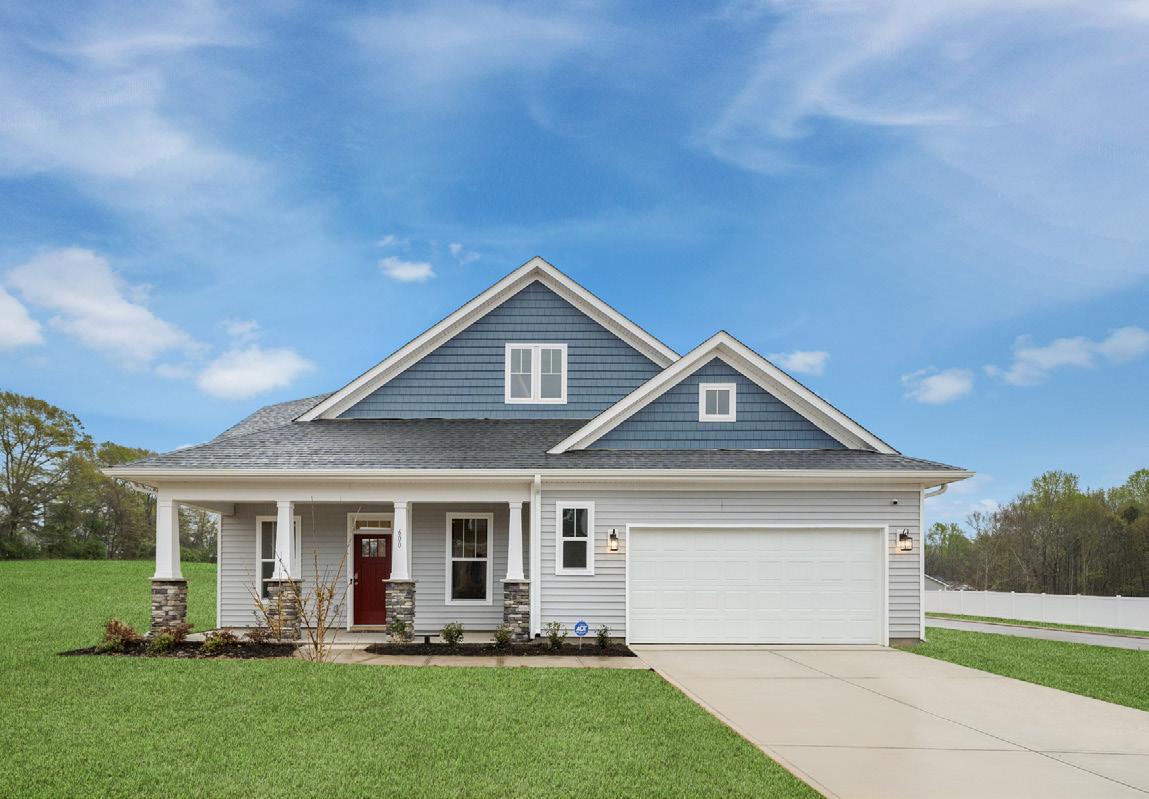




NEW HOMES IN GREENVILLE SINGLE FAMILY HOMES TOWNHOMES Single level living options available. Personalized homes with our Design Center. Choose your lifestyle with DRB homes. Walkable, planned, quaint communities. DRBHomes.com 864.729.4168 DRB Homes reserves the right to make changes to speculative homes under construction. Some images subject to photo likeness and may contain optional structural features and optional interior features and finishes. Colors, exterior finishes, and square footage may vary from pictures and plans. Not all elevations or options shown are available in all communities. All dimensions/square footage are approximate; actual dimensions/square footage may vary. Prices are subject to change without notice. Spartanburg • 864.583.1451 www.cwsinsurance.com CWS Insurance Agency
Jacob Joyce
GUEST CONDUCTOR & MUSIC DIRECTOR FINALIST
Jacob Joyce is a young conductor who’s quickly gained recognition as a dynamic and innovative presence on the podium. Joyce studied Orchestral Conducting with Hugh Wolff at the New England Conservatory. He has also received instruction at the Tanglewood Music Center and the American Academy of Conducting at Aspen.

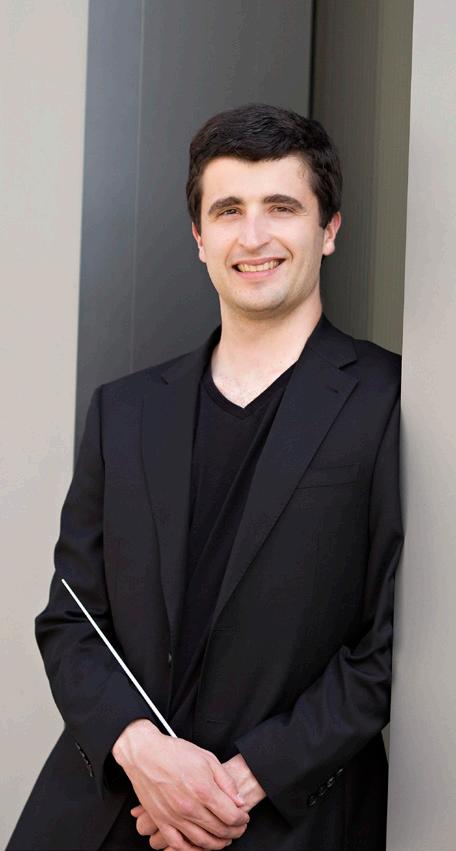
Currently serving as the Resident Conductor of the Indianapolis Symphony. Joyce appeared with the ISO several times in the ‘19-’20 and ‘20-’21 seasons, in various classical, education, Happy Hour, and community concerts. He also made his debut with several American orchestras including the Detroit, St. Louis, Houston, and Toledo symphonies. Joyce previously served as the Conducting Fellow for the
Dominic Chelli
GUEST ARTIST, PIANO
Dominic Cheli’s playing has been described as “spontaneous yet perfect, the best of how a young person can play.” (Symphony Magazine). His rapidly advancing career included his Walt Disney Concert Hall Debut with the Colburn Orchestra where Dominic was “mesmerizing, (he) transfixed the audience...his fingers were one with each key.” (LA Times). He gave his Carnegie Hall Recital Debut in 2019 and has had a busy performing and recording career ever since. He also recently completed work as a composer, audio editor, and performer on the documentary Defying Gravity (2021).
In July 2017, Cheli’s 1st album, featuring the music of Muzio Clementi and released by Naxos, was hailed as “definitive performances, that match
Fort Worth Symphony, with whom he collaborates frequently, and has also held positions as the Associate Conductor of the Yale Symphony Orchestra, and Music Director of the Berkeley College Orchestra.
In recognition of his work, Joyce was awarded the Robert Spano Conducting Prize at Aspen and was a semifinalist in the LSO Donatella Flick Conducting Competition and the Solti International Conducting Competition. Mr. Joyce graduated from Yale College in 2014, with a B.A. in Music and Economics. He also received an M.M. in Violin Performance from the Yale School of Music in 2015, studying with Syoko Aki.
www.JacobJoyceConductor.com
splendid playing with an appreciation of Clementi’s diverse, classically based style.” Also in 2017, Dominic was named 1st prize winner of the Concert Artists Guild Competition in New York City.
With a fascination and appreciation for the benefits of technology especially in our new virtual age, Dominic was appointed LIVE Director of Tonebase Piano in 2021. As a result, he is the host and presenter of numerous virtual lectures, performances and workshops each month to the 5,000+ subscribers on the platform. His mission is to share personal knowledge and invite guests to democratize high-level music education, allowing everyone to learn from and be inspired by the best!
www.DominicCheli.com
ABOUT THE MUSIC ABOUT THE CONDUCTOR
ABOUT THE MUSICIANS 59 HearHere: Spring 2023





p roud sponsor of the SPARTANBURG PHILHARMONIC eatatwades.com My plan to stage, photograph, price, and market your home will hit all the right notes. All the best for a successful 2021-2022 season! Francie Little, REALTOR® & Spartanburg Philharmonic Board Member 864.580.8448 STAGE • PHOTOGRAPH • PRICE • MARKET
HILLCREST SPECIALITY ROW | 1040 FERNWOOD GLENDALE RD, SUITE 48 | SPARTANBURG 864-582-3028 TUE-FRI 9:00 TO 6:00 2022-2023 season!
Calendrier Moonphase
Sister Sadie
THURSDAY
Apr 27, 2023
8:00 PM
@ Chapman Cultural Center
All-Female Bluegrass Powerhouse

This award-winning group originally formed after playing a sold-out show in 2012 at the legendary Station Inn, located in Nashville, Tennessee. In the group’s nine years as a band, they have gained many accolades. In 2018, their sophomore album “Sister Sadie – II” debuted at #2 on the Billboard Bluegrass Charts and was nominated for a GRAMMY Award in the Best Bluegrass Album category in 2019. In March of 2019, they made their debut on the Grand Ole Opry and have been regular guests on the world-famous stage since. Sister Sadie became the first all-female group to be awarded Vocal Group of the Year at the 2019 IBMA Awards. In 2020,
they repeated that award plus took home the Entertainer of the Year Award. The band is also featured in the “American Currents: State of the Music” exhibition through March 2022 at the Country Music Hall of Fame & Museum in Nashville, Tennessee. Most recently, the band took home, for the third consecutive year, Vocal Group of the Year at the 2021 IBMA Awards show in Raleigh, North Carolina.
Sister Sadie is made up of worldrenowned musicians and singers - Gena Britt on banjo, Deanie Richardson on fiddle, Hasee Ciaccio on acoustic bass, Jaelee Roberts on guitar, and Mary Meyer on mandolin.
Info & Tickets:
BLUEGRASS
SPARTANBURG CHAPMAN CULTURAL CENTER
61 HearHere: Spring 2023
We are Wusic Education
SpartanburgPhilharmonic.org/msi
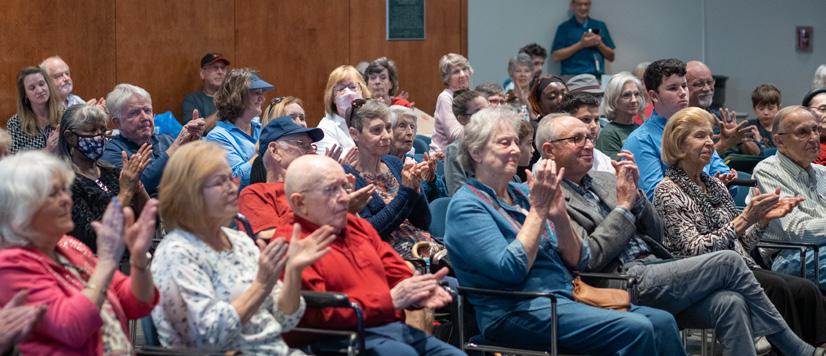
The "Music Sandwiched In" program features 22 free concerts each year held in the Barrett Room of the Spartanburg County Downtown Library. This 25+ year partnership enriches the lives of the intergenerational population of attendees. Over its span, thousands of individuals have enjoyed many genres of music including jazz, bluegrass, classical, and rock. During "Music Sandwiched In" the doors of the Barrett Room are left open, and the 105,000 square foot library is filled with music, laughter, and applause. Attendees are encouraged to bring their own lunch to enjoy the concert or to purchase a lunch on site. All are welcome!
(see page 17 for more details)
SpartanburgMusicTrail.com

Some cities celebrate their war heroes, others their sports stars, but in Spartanburg, it’s all about our musicians. Head out on the Spartanburg Music Trail, a 30-minute outdoor walking tour of the city’s incredibly robust music history. With your GPS enabled smartphone, you’ll be directed to each colorful marker to learn about the artists and hear the music that lifted them onto the national stage. You’ll also discover opportunities for side trips to further explore our musical heritage.

The Spartanburg Music Trail honors musicians from Spartanburg who have made a national or international impact in the world of music. The stops highlight artists in such genres as country, gospel, soul, rock ‘n’ roll and more. Ultimately, the trail will circle the downtown as new inductees are added.



SpartanburgPhilharmonic.org/
For more than 15 years, the Spartanburg Philharmonic has partnered with Carnegie Hall's Weil Institute to present Link Up, a program that works with local communities to explore orchestral repertoire and fundamental musical skills, including creative work and composition, through a hands-on music curriculum.

Link Up addresses the urgent need for music instruction and resources by providing a free, high-quality, yearlong curriculum that teachers can implement, along with classroom materials, online video and audio resources, and the professional development and support necessary to make the program an engaging experience for youth.
The Spartanburg Philharmonic utilizes Link Up to provide a music curriculum to all 4th graders in Spartanburg County. This means over 4,000 youth join the Philharmonic in Twichell Auditorium each Spring for a participatory concert like no other!


SpartanburgYouthOrchestra.org
The Spartanburg Philharmonic Youth Orchestra was founded in 2019 to bring together the best young players from across the Upstate as a core education program of the Spartanburg Philharmonic. A year later, the program expanded to include a second division, offering even more opportunities to young musicians in the community.
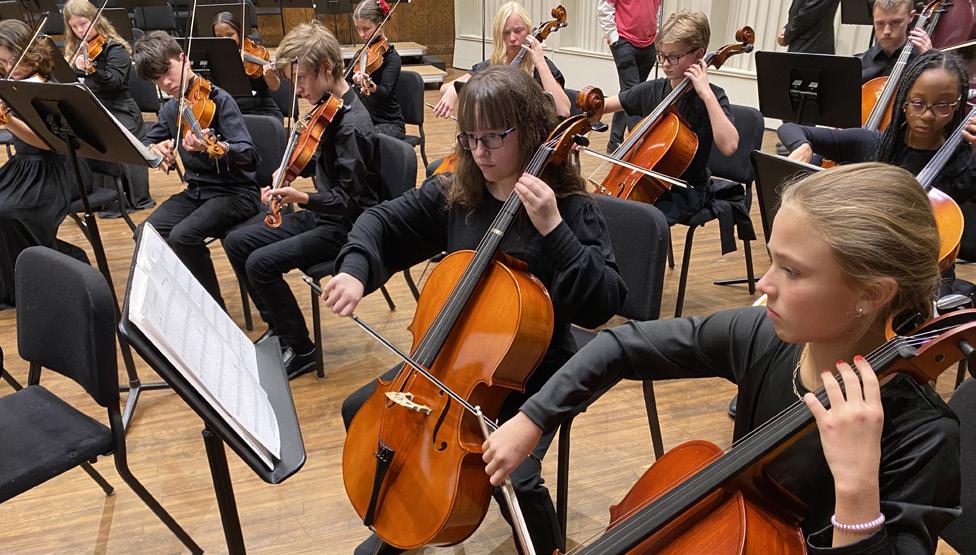


The Youth Orchestra provides a place where musically inclined students learn to master their instruments and collaborate with others to produce three highquality performances each year. Working with the SPYO challenges talented young musicians to grasp difficult repertoires and perform at a higher level than what is possible in their school orchestras. (see page 22 for more details)
 linkup
linkup
Spotlight: Hannah Simpson

Hannah Simpson is thrilled to join the Spartanburg Philharmonic team as the Education Manager. Hannah holds a Bachelor’s degree in Music Education, choral concentration, from Gardner-Webb University and a Masters of School Administration. She served as a choral director for middle and high school students the past 10 years before joining the Philharmonic team.
During her tenure as a teacher, Hannah was her school’s social media director, professional development lead teacher on socio-emotional wellness, data team facilitator for local choral directors, and graduated from the LexRich 5 leadership academy. Hannah’s choral students


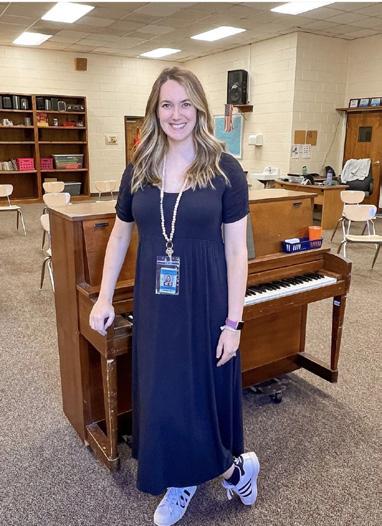
received superior and excellent ratings at local and state competitions and she had students selected each year for district and state honors choruses. Also, Hannah served as the musical director for various musical theater productions with LexRich 5 and the Irmo Chapin Recreation Commission, and published curriculum with PearDeck, an online educational tool.
Hannah is honored to return to Spartanburg and help do the work of connecting to the community, building relationships with students and teachers, encouraging innovation, and helping others achieve their goals through this year and the years ahead.
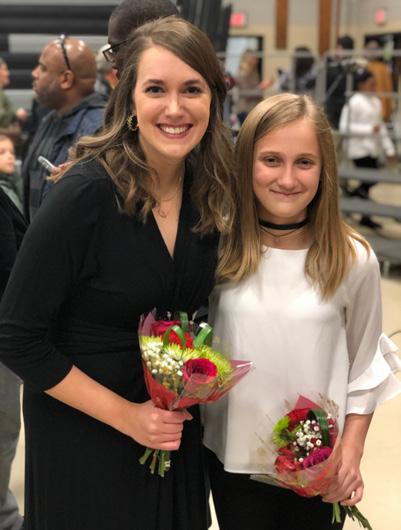
SPOTLIGHT
64 Instrumental to Spartanburg. Noteworthy Pianos. Trusted since 1904. Case Brothers Pianos & Organs 906 S Pine St Spartanburg, SC 29302 (864) 583-1463 | www.casebrothers.com
Spartanburg Philharmonic
A very special THANK YOU to our friends and partners at Brooke USA and An Evening of Divertimentos & Dressage for another memorable fundraising concert event last October!

"Divertimentos and Dressage is musical artistry in motion. The combination of live music with the elegance of dressage makes for a magical experience."

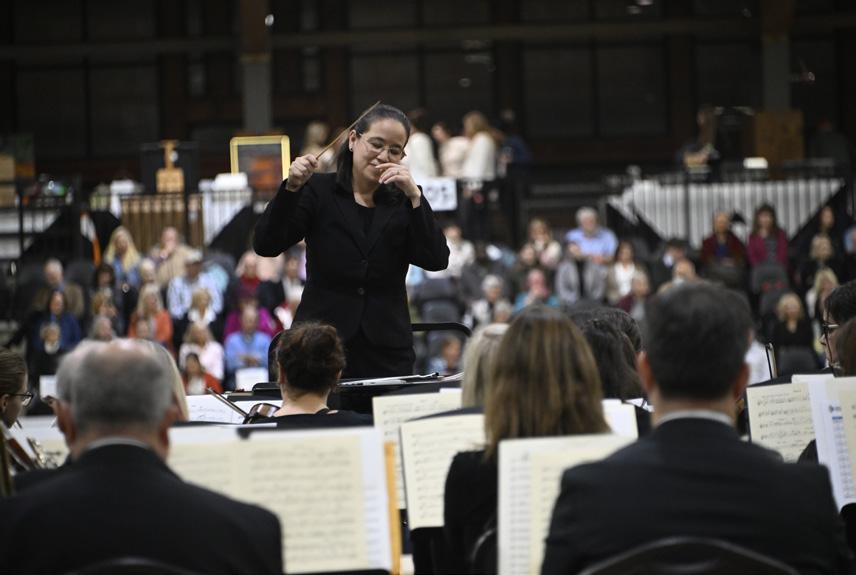


 - Susana M.
- Susana M.

65
Lalama Conductor
22/23 season
For more information, and to book tickets: SpartanburgLittleTheatre.com | SpartanburgYouthTheatre.com Box Office: 864-542-2787
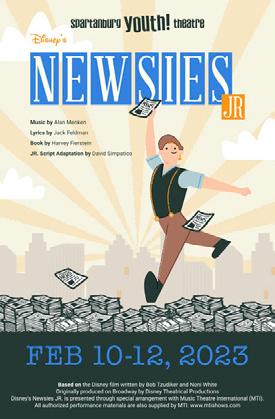
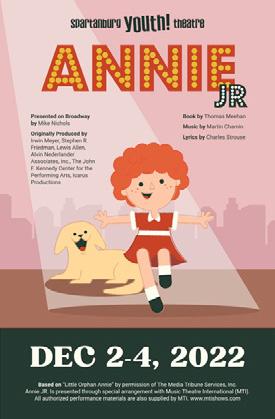



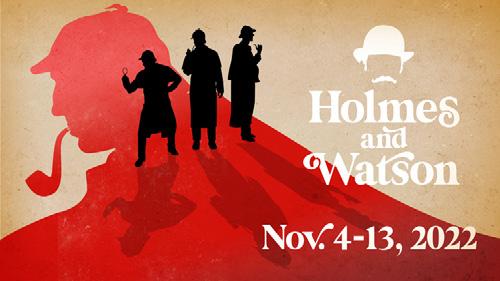


Dr. Caleb Loring IV
Licensed Psychologist
www DrCalebLoring com
Phone: 864.641.6979

Fax: 864.278.0136

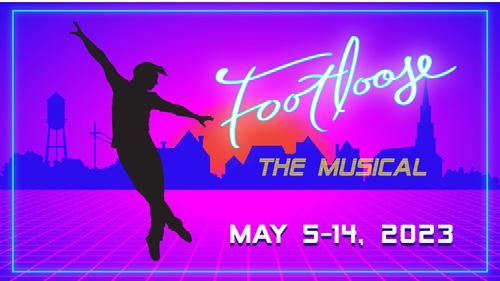
324 East St. John Street
Spartanburg, SC 29302



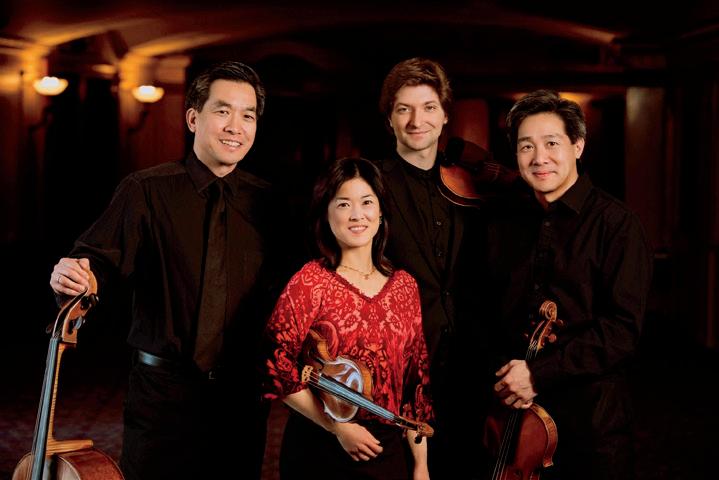




T h e C a r l o s M o s e l e y C h a m b e r M u s i c S e r i e s 2 0 2 2 - 2 0 2 3 T h e C a r l o s M o s e l e y C h a m b e r M u s i c S e r i e s 2 0 2 2 - 2 0 2 3 P E T R I E S C H O O L O F M U S I C P R E S E N T S 09.26.22 Wael Farouk 11.21.22 Ying Quartet 02.27.23 Chanticleer 04.17.23 REBEL Baroque Ensemble D I S C O V E R M O R E ! c o n v e r s e . e d u / C a r l o s M o s e l e y






361 E Kennedy St, Spartanburg, SC 29302 (864) 573-5252 and Estate Vintage JEWELRY 864.216.3129 • PalmettoPalate.com Palmetto Palate Cafe and Catering can help you make your dreams a reality for your special event. 864.216.3129 • PalmettoPalate.com Palmetto Palate Cafe and Catering can help you make your dreams a reality for your special event.







864-576-2828 $500 off $500 off CComprehensive omprehensive TTreatment reatment Let our team take care of your family and friends with this limited time discount Mention this ad or The Spartanburg Philharmonic at your new patient appointment 111 Powell Mill Road Suite B Spartanburg SC 29301 www drbuddy com V i c B a i l e y L i n c o l n c o m ( 8 6 4 ) 5 8 5 - 3 6 0 0 5 0 1 E D a n i e l M o r g a n A v e , S p a r t a n b u r g , S C 2 9 3 0 2 V I C B A I L E Y L I N C O L N PROUDLY SERVING SPARTANBURG S I N C E 1 9 6 9 THE 2022 LINCOLN NAUTILUS C o m f o r t I n T h e E x t r e m e CUSTOM ORDERS NOW AVAILABLE https://www.dropbox.com/s/ imeano2qcpech4p/Peter%20and%20 the%20Wolf%202.mp4?dl=0




ADVERTISER INDEX Ballet Spartanburg 21 Bella Vision 44 Bernhardt House of Violins . . . . . . . . . . . . . . . . . . . . . 24 Caleb Loring, Licensed Psychologist 66 Case Brothers Pianos & Organs . . . . . . . . . . . . . . . . . . . 64 Chapman Cultural Center 11 CWS Insurance Agency . . . . . . . . . . . . . . . . . . . . . . . . 58 Davis Orthodontics 69 DRB Homes . . . . . . . . . . . . . . . . . . . . . . . . . . . . . . 58 Francie Little, Coldwell Banker Caine 60 George Johnson Insurance . . . . . . . . . . . . . . . . . . . . . . 2 Henderson, Brandt & Vieth, P.A., Attorneys at Law 57 Hodge Floors 66 Judy McCravy, Coldwell Banker Caine 42 Lawson Academy of the Arts 46 Milliken 52 Palmetto Palate 68 Reel Robertson, C.P.A. 18 Smithworks 68 Southern Palms Chiropractic & Wellness 27 Spartanburg | Greer ENT & Allergy 18 Spartanburg Art Museum 44 Spartanburg Day School 72 Spartanburg Little Theatre 66 Spartanburg Regional Healthcare System 36 Spartanburg School Distric 7 70 St. Luke’s Urology Associates 71 Summit Hills 16 The Carlos Moseley Series 67 The Johnson Group . . . . . . . . . . . . . . . . . . . . . . . . . . 14 The Local Hiker | Hiker Hub 42 TNB Financial Services . . . . . . . . . . . . . . . . . . . . . . . . 38 United Community Bank 21 V.C. McLeod, CFP / Merrill Lynch Wealth Management . . . . . 29 Vic Bailey Lincoln 69 Wade's Restaurant . . . . . . . . . . . . . . . . . . . . . . . . . . 60 Watchworks 60 Wofford College Arts . . . . . . . . . . . . . . . . . . . . . . . . . 46 Young Office 56 Interested in advertising with the Spartanburg Philharmonic? Please contact Kathryn Boucher: kathryn@spartanburgphilharmonic.org (864) 948-9020
Dr. Barry Bodie, MD, FACS

Dr. Barry Bodie of St. Luke’s Urology Associates

is a top provider of contemporary urologic care to men and women. Cleveland Clinic trained, Dr. Bodie is board-certified by the American Board of Urology. He’s dedicated to quality, safety, and technology to provide a higher level of care not often found in the up-country. Dr. Bodie accepts new patients at our offices in Columbus and Forest City, North Carolina. Keep


Healthier with St. Luke’s Urology Associates. WORKING HARDER to Keep You Healthier
894-3230 54 Hospital Drive, Building 3B Columbus, NC 28722 StLukesNC.org HHHHH
Yourself
(828)
the
of Urology
Certified by
American Board
•
and
•
kidney
bladder
male reproductive tract
prostate
Specializing in contemporary urologic treatment for:
men
women
incontinence •
stones •
complications •
issues •
concerns

be passionate be more EDUCATION FOR LIFE Two Years through 12th Grade 1701 Skylyn Drive, Spartanburg, SC 29307 864.582.7539 admissions@sdsgriffin.org spartanburgdayschool.org





























 Karen Parrott President
Dr. Barry Bodie
Dr. Chandra Hopkins
Bert Shuler
James Cheek
Dr. Ohmar Land
Tamela Spann
John Cribb
Samantha Larkins
Helen Tipton
Francie Little
Kate White
Dr. Mark Ferguson
Judy McCravy
Dr. Meisha Whitlock
Peter Grzan
Alex Hunt North Kelsey Wilkes
Laura Henthorn
Dr. Rick Orr
Dr. Cabe Loring President Elect
Karen Bjelland Treasurer
Chris Strickland Secretary Chip McLeod Past President
Karen Parrott President
Dr. Barry Bodie
Dr. Chandra Hopkins
Bert Shuler
James Cheek
Dr. Ohmar Land
Tamela Spann
John Cribb
Samantha Larkins
Helen Tipton
Francie Little
Kate White
Dr. Mark Ferguson
Judy McCravy
Dr. Meisha Whitlock
Peter Grzan
Alex Hunt North Kelsey Wilkes
Laura Henthorn
Dr. Rick Orr
Dr. Cabe Loring President Elect
Karen Bjelland Treasurer
Chris Strickland Secretary Chip McLeod Past President















 Ian Bracchitta Principal Bass
Alvoy Bryan Jr. Principal Viola
Andrew Merideth Associate Principal Horn
Theresa Jenkins Russ Violin Section
Kelly Vaneman Associate Principal Oboe
Diana Maley Berti Orchestra Committee Chair, Viola Section
Ian Bracchitta Principal Bass
Alvoy Bryan Jr. Principal Viola
Andrew Merideth Associate Principal Horn
Theresa Jenkins Russ Violin Section
Kelly Vaneman Associate Principal Oboe
Diana Maley Berti Orchestra Committee Chair, Viola Section




 Kathryn Boucher, Executive Director
Kathryn Boucher, Executive Director











































































 Interim Concertmaster
Interim Concertmaster






























































 linkup
linkup









 - Susana M.
- Susana M.





































